Joyce T. Strand's Blog, page 6
August 30, 2016
WHAT THE EXPERTS SAY: McKenna Grey & Everly Archard, Authors
 McKenna Grey, Co-Author
McKenna Grey, Co-AuthorTHE DRAGON'S STAIRCASE
 Everly Archard, Co-Author
Everly Archard, Co-AuthorTHE DRAGON'S STAIRCASEJust-released, THE DRAGON’S STAIRCASE is a romantic suspense novel by award-winning authors McKenna Grey (pseudonym for historical romance and mystery author MK McClintock) and Everly Archard (pseudonym for paranormal and fantasy romance author D.D. Piers). It is the first of their Kyndall Family Thrillers. Reviewers say it’s a “heart-stopping non-stop, thrilling suspense….with a romantic touch!”
The two authors found that “the collaboration was a lot of fun” and are currently working together on the next Kyndall Family Thriller, Shadow of the Forgotten. Both authors are avid readers—when they can take a break from writing. McKenna likes the outdoors and also enjoys baking. Everly loves to garden and take photos.
Don't miss the except following the interview.
Q: You have described THE DRAGON’S STAIRCASE as contemporary romantic suspense and reviewers say, “The suspense level is amazing.” What makes the novel suspenseful?
McKenna Grey and Everly Archard: I believe it’s the build-up and intensity emanating from the characters and the events in their lives. We really wanted to take the reader on a roller-coaster ride. No matter how detailed the outline or notes, we didn’t restrain the characters, even the “bad guys,” and we ended up surprising ourselves a few times along the way.
Q: What are the characteristics of a compelling romance? How do you build the romantic relationships? Do your characters love each other at first sight? Do opposites attract? Does the suspense increase the romantic interest? Or vice versa?
McKenna Grey and Everly Archard: Romance should feel natural, as though two people have no choice but to acknowledge that they’re better together than apart. In this story, the characters’ passion is heightened by the intense situations in which they find themselves. There isn’t a chance to begin as friends and build up. However, they build upon trust, the need they both have to believe in each other and trust themselves.
I definitely think opposites can attract, but I also believe that a relationship has a much stronger chance when there’s a common ground, an accepted belief system about life in general, that they both share.
The suspense plays a major role in the romantic interest, but only in the beginning. They may be thrust together because of circumstances, but what happens afterward is all about two people finding their way to each other.
Q: One of your reviewers appreciates the “well-developed characters.” How do your characters connect to your readers? Why will readers care what happens to them?
McKenna Grey and Everly Archard: I love when someone comments on the characters because they’re always my favorite part of writing. I enjoy spectacular scenery well-described, but it all comes down to the people in the story. Alexa and Craig, I believe, are relatable. They have strengths, weaknesses, they experience fear, loss, passion, love, hate—they’re human, and they matter. What happens to them matters because on some level, most people have felt the same emotions, and they want their own happily ever after . . . or as close to it as possible.
Q: Does the concept of “hero vs villain” apply to THE DRAGON’S STAIRCASE? What makes an effective villain?
McKenna Grey and Everly Archard: Definitely. Except in this case we really have more than one hero. Both Alexa and Craig bring their own set of strengths to the mix, and both have to use those strengths in order to defeat both their metaphoric and real-life villains.
An effective villain, I believe, is one who is somewhat average. If you strip away whatever makes them “evil,” you’re left with an oftentimes pathetic human being who couldn’t find a way to live a better life. Perhaps they’re intelligent, but misdirected their smarts down a dark path. Something in them chose to become who they are, and I believe no matter what their reasons, something is behind why they do what they do. It doesn’t make it right, but it makes them less than the hero, less than a person worthy of a happy ending.
Q: Did you write THE DRAGON’S STAIRCASE strictly to entertain your readers? Or did you embed a few messages along the way?
McKenna Grey and Everly Archard: I believe any story can contain a few hidden messages, whether the writer realizes what they’ve done or not. In truth, I’m not sure either of us really thought about an underlying message, but you have me thinking now! Really, it’s ultimately about having confidence in yourself and believing that no matter how difficult, how challenging life can become, there’s always a way out, and there’s always someone to help. We don’t have to stand on our own; it’s okay to lean on a friend, a lover, or a stranger if that’s what it takes . . . And we wrote it to entertain our readers.
Q: Do you use your setting to either enhance your plot or add to your characters?
McKenna Grey and Everly Archard: I’ve always thought of settings as characters. The setting plays a part, albeit in the background. The area of North Carolina where most of the story is set, is beautiful. The vibrant colors of autumn and the lush forests covering the Blue Ridge Mountains can be quite breathtaking. Contrast that with murder and mayhem, and you bet, the setting plays a definite role.
Q: How helpful is humor to create your characters?
McKenna Grey and Everly Archard: A bit of levity is always appreciated in a story, but when you have a suspense or thriller, a touch of humor here and there is necessary if for no other reason than to give both the characters and the readers a break from the intensity.
Q: Given that you are two authors, how do you divide the tasks of writing? Do you brainstorm the plot? Is one of you responsible for creating a character? Do you assign tasks before you start?
McKenna Grey and Everly Archard: We certainly share in the creative process. I (McKenna) had developed the plot and characters for the first book and the series long before I met my co-author or even wrote a book, so I took point on the first outline. However, Everly also added her thoughts and notes to the outline, so by the time we started to write, it was two minds as one sort of scenario. For the other books in the series, we’ve both shared in the brainstorming for the plots and outlines.
We don’t assign tasks, but we do assign chapters. We work off of one manuscript and each take three chapters from the outline, moving in chronological order. When we pass off the updated manuscript, the other person will read through our chapters, offer notes, and then write their three chapters. We go back and forth until the book is complete. It just worked out to be a great way for us to collaborate, and to each have an equal voice in the story.
Q: What’s next for both of you? Will you write another in the Kyndall Family Thrillers ?
McKenna Grey and Everly Archard: Absolutely! We’re already 1/3 the way through the second book, Shadow of the Forgotten, and it’s coming along great. There will be two more Kyndall thrillers in the series. After that . . . well, we’ve discovered this is such a fun process, we’ve planned more series and we’re currently developing those storylines. I’m certain we’ll each write our own books under these pen names (we both write under other names as well), but for now, the collaboration is a lot of fun.
Q: What do you both like to do when you’re not writing?
McKenna Grey: When I’m not writing . . . doesn’t happen often these days! Reading is a given; I’m never without a new book. I love spending time outdoors, whether it’s hiking, walking my pup and taking photographs, or gardening. I like to sit on a rock by the river and read a book, or walk along the lake and watch the sunset. I also love to spend time in the kitchen. Baking and cooking relax me.
Everly Archard: I love, and I mean LOVE, to read. So if I'm not in the middle of a good book, I'll be searching for something new to read. I also love to garden or practice amateur photography. If I'm in the mood to stay indoors and burn brain cells, I indulge in my favorite guilty pleasure, Bravo TV.
About McKenna Grey
McKenna Grey is the contemporary alter-ego of award-winning historical romance and mystery author MK McClintock. Never one to limit her imagination or ignore possibilities, she decided to venture into the realm of contemporary romantic suspense and thrillers.
About Everly Archard
Everly Archard is the pseudonym of award-winning paranormal and fantasy romance author D.D. Miers. Her passion for romance with an edge led her to explore the world of romantic suspense.
About THE DRAGON’S STAIRCASE
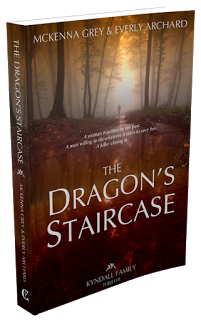 From two award-winning authors comes the first riveting novel in the Kyndall Family Thrillers, a contemporary romantic suspense series filled with spine-tingling thrills and alluring romance.
From two award-winning authors comes the first riveting novel in the Kyndall Family Thrillers, a contemporary romantic suspense series filled with spine-tingling thrills and alluring romance. A woman haunted by her past.
FBI Agent Alexa Kyndall devoted eight years of her life to the search for justice, showing no mercy to the guilty and depraved. When she joins a special task force to bring down a serial killer, Alexa encounters the most unexpected criminal of her career.
A man willing to do whatever it takes to save her.
When a child witnesses a brutal slaying, Alexa’s life becomes intertwined with Craig Pierson’s, a man with his own haunted past. They join forces, only to discover they must put everything on the line in a pulse-pounding struggle to protect and survive.
A killer closing in.
Nestled in a small town in the Blue Ridge Mountains of North Carolina, The Dragon’s Staircase is an intriguing, nonstop adventure that will keep readers enthralled from start to finish.
Excerpt from THE DRAGON’S STAIRCASE
“Oh, shut up.” The alarm beeped until she punched in the code. Alexa dropped her keys into the wooden bowl on the stand by the front door, dropped her handbag over a coat rack peg, and leaned against the closed door until she heard the click. She had seen in Craig’s eyes what must surely have been reflected in her own. The wanting, the need, and the impossibility of any kind of liaison between them. She was a wasted effort in the relationship department, and the sooner they both figured that out the less chance of heartache later.She noticed the cold for the first time since entering, and this time the shiver through her body wasn’t from Craig. She pulled the pistol she’d slipped into her handbag back at Craig’s house. Jordan would still be out on the wilderness journey, or “trek” as they called them in their family. Why then did she not feel alone in the spacious house set back in the woods and away from anyone who could hear her scream?“Get a grip, Alexa.” She walked through the lower level, checking every window and door, and did the same upstairs. The coldest of the air emanated from her bedroom and it was in the doorway she stood and surveyed the dark room. Everything was as she left it, except for the envelope propped against her mother’s old jewelry box on the dresser. Her finger lay loose and ready near the trigger as she walked across the room, moonlight guiding her way. Alexa. The script on the front of the envelope appeared all too familiar and Alexa knew the nightmare had returned, but this time he was real.
Links
Purchase LinksAmazon | BandN| Kobo
Book Trailer
Authors’ LinksMcKenna Grey Website Everly Archard Website
Published on August 30, 2016 21:25
August 15, 2016
WHAT THE EXPERTS SAY: J. J. Knights, Author
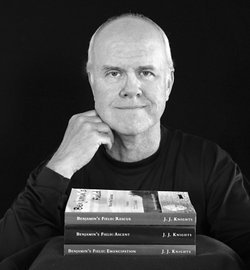 J. J. Knights, Author
J. J. Knights, AuthorBENJAMIN'S FIELD TrilogyJ. J. Knights’ novel, the BENJAMIN'S FIELD Trilogy, tracks three generations of a family in the U.S. from WWI through WWII. Knights has taken care to assure historical accuracy and believes that fiction can help educate if entertaining and accurate. Reviewers praise the “themes of loyalty, personal liberty as it relates to society’s demands, religious prejudice, racism, intolerance, and the overwhelming need for humans to forgive one another.”
A retired FBI Special Agent, Knights is currently working on his next novel based on actual events occurring in the American Civil War. When he’s not writing, he participates in Team Rubicon, an organization that provides disaster relief services. He loves spending time in Canada, volunteering his photography services, and beekeeping. And he enjoys chasing his 18-month old granddaughter around.
Q: In what genre would you place your BENJAMIN'S FIELD Trilogy? Literary fiction? Historical fiction? Why?
J. J. Knights: The BENJAMIN'S FIELD Trilogy is definitely historical fiction.
The story is a saga covering three generations from World War I to World War II and beyond.
My research was painstaking and involved not only online sources, but actual books. In addition to life’s lessons the story teaches, I want my characters to bring the historical events that shaped the 20th century alive for my readers.
We live in a much more permissive society today than existed one hundred years ago. Do young people today understand what it was like for an unwed mother back then? How about for a child born with a disability? What about the effects of organized religion or the importance of fraternal societies?
Does anyone remember the Golden Age of Aviation and how every child dreamt of becoming an aviator? Do today’s young people know what an aviatrix is without looking it up on their smart phones?
Seven decades before 9/11 there was Pearl Harbor. Like the attacks on 9/11, Pearl Harbor galvanized the American people. Unlike 9/11, that galvanization wasn’t short-lived and helped bring us to victory.
How many people know an organization of civilian pilots sunk at least one German U-Boat during WWII or that such an organization even existed?
Well-written and accurately researched historical fiction has an important role to play in education.
Q: Reviewers say about the trilogy that “once the plot catches you it won't let you go” and that the series is “enormously entertaining and instructive.” How do you manage to entertain and also instruct readers?
J. J. Knights: To instruct seriously and well, one must be a bit of an entertainer. If not, you will lose your audience, be they university students, student pilots, or readers who can easily put your book down and pick up someone else’s.
Imagine sitting in church or some other place of worship, a university classroom or some similar place. If the priest, minister, rabbi, professor or whomever simply stands there and drones on, you’ll fall asleep. On the other hand, if he or she moves about in front of you and injects drama and humor into the sermon, they’ve got you. We’ve all had boring teachers.
In the case of writing a story like BENJAMIN’S FIELD, I used intensely emotional scenes and drama tempered with comic relief to keep the reader engaged, but not overwhelmed. Humor is necessary to relieve the pressure created by the drama and emotion. You don’t want the reader to feel bludgeoned.
In Book One, RESCUE, Benjamin, the protagonist, and the priest Templeman, have issues to resolve, so I put them in a very emotional, soul-baring encounter. The pressure builds until Benjamin’s hired hand, Hiram, appears unexpectedly with a one-liner that will cause the reader to smile or laugh.
The reader must also be able to relate to what the character is experiencing. That’s why I put the characters in highly charged situations that we’ve all experienced or at lease can understand. For instance, throughout history, there have always been young men who terrified their parents by saying, “The country is at war. I’m joining the army.” It’s been said in different languages and accents, but it’s been said since humans have walked the earth. My brother and I did it to my parents and my son did it to my wife and I. Even if it hasn’t happened to you, you can still relate to it.
This, and much more, happens in the story.
Q: Your trilogy covers much of the 20thcentury. What kind of historical research did you do? How important is historical accuracy to credibility? Were you able to use history to support or amplify your plot and themes?
J. J. Knights: Since BENJAMIN’S FIELD is a historical novel, I did a great deal of research. The Internet has made this chore much easier and economical (no need to travel to distant libraries, etc.), so I did much of the research online. However, I also used real books. Some I borrowed. Some I purchased. Actually, I enjoyed the research and found it very educational even if much of what I found didn’t make it into the story.
I also spoke with subject matter experts, among them priests, a Catholic sister, an expert on canon law, a Freemason, a retired orthopaedic surgeon, a rabbi, a representative of Shriners Hospitals for Children, and an expert on the history of rail travel in western Pennsylvania. I even took advantage of my own family genealogist and put my great, great grandfather, a Canadian sea captain, in the story, though I changed his role and place in the historical timeline. I thanked all of them in the Acknowledgements.
I was very careful to make the story as historically accurate as possible, but sometimes I had to tweak history for the sake of the story. For example, In Book Two ASCENT I have Jeremy Kyner, the protagonist, attending the 1932 Cleveland Air Show. The airshow took place in August of that year. I moved it to September for reasons explained in the Afterward.
How important is historical accuracy to credibility? I suppose this is subjective, but I’d say it’s very important. Why should someone take what I’m saying seriously if I can’t get the facts right? For instance, I wanted to refer to actual newspaper headlines and stories in Book One RESCUE. I have Benjamin Kyner, the protagonist, reading that America had declared war against Germany in the April 6, 1917 edition of the old Pittsburgh Press. I was able to quote the paper exactly thanks to the assistance I received from the Hillman Library at the University of Pittsburgh. The staff put me on to an online source for digitized newspapers going back to the 19th century.
Depicting historical events accurately was very instrumental in amplifying the plot and themes. A main theme in BENJAMIN’S FIELD is overcoming prejudice and intolerance. In the previous paragraph, I spoke about using actual headlines from real newspapers from the period. So, in the same issue of The Pittsburgh Press, we see Benjamin’s son, Francis, reading glorified front-page reports of courageous aviators. A bit later, Hiram Bolt, Benjamin’s African American hired hand, picks up the paper and notices that stories about Black military units are buried in the back pages.
So, yes, history is very important to the themes in the story.
Q: Who do you intend to read the trilogy? Young adults? All ages? What do you want them to walk away with?
J. J. Knights: I consider BENJAMIN’S FIELD to be in the Young Adult genre, though I believe it would be both entertaining and valuable for older readers, as well.
As to why, here’s an excerpt from the Forward by retired astronaut Jay Apt:
Especially useful to young readers, but valuable to us all, are the story’s lessons about this journey: our greatest achievements are for others, not ourselves; overcoming difficulties makes us stronger; disappointments can be blessings in disguise; help can come from unexpected sources; sometimes one door must close so another can open; it’s futile to blame the universe or a higher being for pain that’s inflicted by our fellow human beings.
Q: Reviewers are pleased that you were able to integrate themes such as “loyalty, personal liberty as it relates to society’s demands, religious prejudice, racism, intolerance, and the overwhelming need for humans to forgive one another.” Did you intend to leave readers with some messages? Or did you write purely for their entertainment?
J. J. Knights: Authors write for different reasons, of course. Richard Bach, author of Jonathan Livingston Seagull, once said that he doesn’t feel the need to write constantly, but only when an idea insists on getting out of his head and onto paper.
That’s the way I felt about BENJAMIN’S FIELD. The story was in my head begging to get out.
I didn’t write it merely for the sake of putting words on a computer screen. I certainly didn’t write it for the money! I wrote the story because I truly believed it has socially redeeming value. I wrote it because I think the themes and lessons presented in the story can be helpful to young people, especially those who may feel marginalized for whatever reason.
I should explain that while aviation plays a strong supporting role in the story, it’s not what the trilogy is about. My goal was to use aviation and flying as sort of a philosophical metaphor. Jeremy Kyner is being held down by society, but uses aviation to lift himself up and eventually find final emancipation. I hope the reader sees this. Also, we use airplanes to take us places. That’s how I use them in the story; to take the reader on a journey. To underscore these concepts, I don’t use the words ‘airplane’ or ‘aircraft’ anywhere in the story. That was a challenging feat to accomplish.
Q: How helpful was your career as an FBI agent in creating your plot or characters?
J. J. Knights: As far as I can determine, I did not draw on my experiences in the FBI to write BENJAMIN’S FIELD. That being said, the characters in a work of fiction are born in the imagination of the author. Since we are the sum or our experiences, it’s inevitable that we’ll draw on our experiences and the people we’ve known to create the personalities that populate our stories.
For instance, there’s a bit of my father in Benjamin. Although he had no religion and often ridiculed it, as is the case with Benjamin, one of my father’s best friends was a Catholic priest. As for the priest, some part of him is alive in the story’s Fr. James Templeman.
So, a psychologist might be able to dig out how my FBI career may have influenced my writing of the story, but I really can’t.
Q: Does the approach of heroes vs villains apply to your story? Or are your characters mostly a mix of heroic and not-so-heroic behavior? –flawed but well-intentioned?
J. J. Knights: There are villains, both without and within.
Since we’re all flawed, so are the characters in the story, both major and minor. Both Benjamin Kyner, the protagonist in RESCUE, and his grandson Jeremy, the protagonist in ASCENT and EMANCIPATION, are definitely flawed, but in different ways. We follow them through their stories to learn how they overcome their flaws. Other characters, such as Fr. James Templeton, Randy Bridgewater and Phil Anders have glaring flaws, which are critical to helping Benjamin and Jeremy overcome theirs.
Yet, there are also real ‘external’ villains in the story, such as Jeremy’s eighth grade teacher, Regina Vilis (translate the Latin!) and the U-Boat commander in Emancipation. Why villains without and within? Evil is necessary. Without overcoming evil, we cannot find the good in ourselves and each other.
Q: How helpful was the use of humor to developing your characters or telling their story?
J. J. Knights: As I discussed earlier, humor is necessary as comic relief for the reader. There are several very intensely emotional scenes in the story, and I don’t want the reader to feel as though I’m beating them up. Also, I want the characters to be as real to the reader as they are to me. Most people like to laugh. So do the characters in BENJAMIN’S FIELD.
Q; What’s next? Will you continue to write novels?
J. J. Knights: I’m currently working on another historical novel based on actual events during the American Civil War. I was inspired by my many visits to the Gettysburg National Battlefield in eastern Pennsylvania as well as my close association with Canada. How are the two connected? Stay tuned.
Q: Tell us about J. J. Knights. What do you like to do when you’re not writing?
J. J. Knights: I recently joined a veterans’ service organization called Team Rubicon that provides disaster relief services both domestically and abroad. As a matter of fact, just prior to writing this, I spent several days in Wisconsin participating in a joint disaster response exercise with Team Rubicon and the Wisconsin Air National Guard.
I’m an avid amateur photographer and perform a lot of ‘pro bono’ shoots for different organizations. Very recently I was asked to cover the 2016 annual convention of the National Association of Priest Pilots in Pittsburgh. As their name implies, NAPP is a group of priests who own or fly general aviation airplanes, often in support of their ministries.
I spend a good deal of time in Canada where I maintain a rental cottage (Northern Knights Sea View Cottage) on Canada’s smallest and most beautiful province, Prince Edward Island. Coincidentally, PEI was home to Benjamin Kyner’s wife, Delinah. Delinah’s character was inspired by a real French Canadian woman of the same name I knew as a child on PEI.
I have to mention that I have the fun of chasing around my 18-month old granddaughter, Lillian Noelle, and, as I mention on the back of my books, I’m also a beekeeper.
About J. J. Knights
J. J. Knights is a retired FBI Special Agent. His assignments included violent crimes and fugitives, property crimes, civil rights investigations, and foreign counterintelligence. He was a surveillance pilot, SWAT sniper, media representative, and worked in the FBI's technical investigations program. Knights also volunteered as a Civil Air Patrol pilot, squadron commander and public information officer. He is an emeritus member of the Imperial Public Relations Committee of Shriners International and Shriners Hospitals for Children. A native of New England, Knights resides in southwestern Pennsylvania with his wife and honeybees. He has authored several published articles on law enforcement recruiting. Benjamin's Field is his first novel.
About BENJAMIN’S FIELD
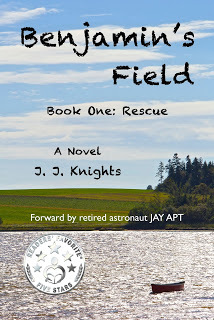 Book One: RESCUE
Book One: RESCUEForward by retired NASA astronaut Jay Apt, PhD, veteran of four space shuttle missions.
Benjamin’s Field: Rescue’ has been awarded a five-star review by the literary site ‘Reader’s Favorite’ (readersfavorite.com).
Benjamin’s Field follows a rural farm family over the course of sixty years from the viewpoint of the youngest member, Jeremy Kyner. Beginning with America’s entry into World War I, Jeremy and his family are followed through war, peace, triumph, tragedy, heartbreak, and final happiness as the reader examines the role of family loyalty versus individual need, personal liberty and how it relates to society’s demands, religious prejudice, racism, intolerance, the role of charity, and the overwhelming need for humans to forgive one another.
While still in manuscript form, Benjamin’s Field, Book One RESCUE, was advanced to the “Best Sellers Chart” of the peer review website YouWriteOn.com. In Book One RESCUE a widowed farmer suffers an unspeakable loss during World War I. Burdened with grief, he learns from his nemesis, a dogmatic Catholic priest, that his son’s fiance has given birth to their crippled child. Unable to cope with the child’s deformity and confounded by his illegitimate birth, the farmer is battered by those closest to him with accusations of cruelty and intolerance until he finally reveals his true feelings and the reasons underlying his apparent bigotry.
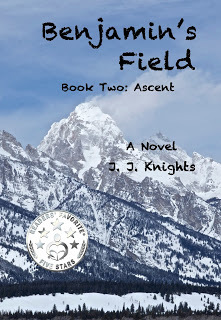 Set in a historical context, BENJAMIN’S FIELD is a compelling story about human dignity overcoming adversity, prejudice, and hatred. Interwoven with lighter moments, this dramatic and moving tale will take the reader on an emotional and sometimes humorous journey.
Set in a historical context, BENJAMIN’S FIELD is a compelling story about human dignity overcoming adversity, prejudice, and hatred. Interwoven with lighter moments, this dramatic and moving tale will take the reader on an emotional and sometimes humorous journey.Book Two: ASCENT
In Book Two ASCENT Jeremy Kyner, now a teenaged boy, becomes the focus of his teacher’s animosity because of his infirmity. With the help of two dedicated school friends and an unconventional Jewish blacksmith, he takes to the sky, defeating his teacher’s plans to institutionalize him and forcing her to divulge her own, dark, secret.
BENJAMIN’S FIELD is a historical novel about human dignity overcoming adversity, prejudice, and hatred. Interwoven with lighter moments, this dramatic and moving story will take the reader on a journey of inner exploration.
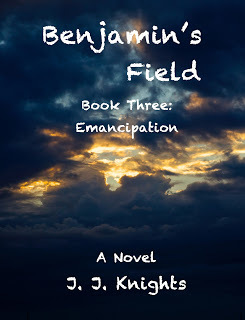 Book Three: EMANCIPATION
Book Three: EMANCIPATIONBook Three EMANCIPATION opens as America is on the cusp of World War II. Jeremy Kyner, now a man, is barred from military service at a time when America is almost defenseless against marauding German submarines. Finally joining a group of volunteer civilian pilots that represents the country’s best hope to counter the Germans, Jeremy confronts a deadly enemy from an unexpected quarter and is offered a chance of achieving final emancipation.
BENJAMIN’S FIELD is a historical novel about human dignity overcoming adversity, prejudice, and hatred. Interwoven with lighter moments, this dramatic and moving novel will take the reader on a journey of inner exploration.
Excerpt“Ben, what in blazes is going on?” asked Hiram. “Is that what I think it is? I never saw one before.” “It sure looks like a flyin’ machine,” Benjamin answered. “I’m as surprised as you, but I’m gettin’ mighty damned mad that some fool just scattered my cows and knocked me into the dirt.” Hiram doffed his hat and wiped his forehead. “Why is that thing buzzin’ around here?” he asked.“Hiram, you know as much as I do. But if I get my hands on him, whoever is in that thing’ll wish he hadn’t come here to show off. Damned idiot.”Together, they watched as the machine flew east parallel to the field. Then suddenly, just as they began to think it would continue on and leave them in peace, the strange craft turned left again and began to drop from the sky. As it neared the end of the field, it turned again, lowering its nose and aligning itself with the field. Just as it appeared to the two men that it would again scream over them, the tempo of the engine’s roar slowed. The machine neared the ground and leveled off a few feet above the grass. The cows, now scattered, were no longer a danger to the flying machine.Benjamin and Hiram stared slack-jawed as the boxy kite-looking thing approached them. The roar of its engine dropped to a murmur and its wheels touched the grass. It bounced along the rough field, wings wobbling, toward the two gawking spectators.Benjamin, alternately amazed and then angry at what he was seeing, began to allow his anger to hold sway. Resentment was welling up inside him as if it had a life of its own; resentment at this intruder who surprised him; resentment at having to hurl himself to the ground like a frightened fawn; resentment at having no control over what was happening on his own land. Hiram, sensing Benjamin’s coiling anger, looked down at his fists. He placed his hand on Benjamin’s shoulder and said, “Ben, let’s take it easy. We don’t know what’s goin’ on here. It could be he’s in trouble.” The quivering, cloth-wrapped machine trundled to a stop a few feet from Benjamin and Hiram. The long, slowly swinging wooden propeller emitted loud clicks at longer and longer intervals as it finally swung to a stop and puffed out one last gasp of blue-white smoke from the exhaust pipes on the top of the cowling. The machine had two wings, one above the other, just like in the newspaper photographs. Under the top wing, Benjamin could see two leather-encased heads protruding from the machine’s body. One was a few feet behind the other. Both wore goggles that gave them bug-like appearances. For the second time that day, Benjamin was speechless as the bug figure in front lifted his goggles to his forehead, waved at him and with a big smile said, “Hi, Pa!”
Links
Exclusive to Amazon
Author Links: Website | Twitter | Facebook Twitter: https://twitter.com/JJKnightsAuthor Goodreads Link
Link to Follow Tour
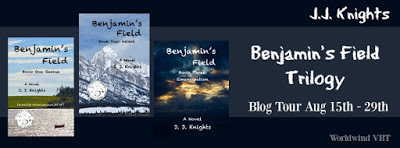

Published on August 15, 2016 19:51
August 10, 2016
WHAT THE EXPERTS SAY: Lynn Steward, Author
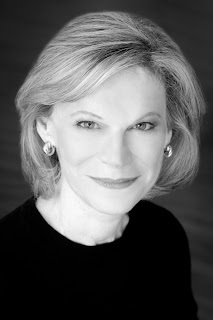 Lynn Steward, Author
Lynn Steward, AuthorWHAT MIGHT HAVE BEEN
A VERY GOOD LIFEReviewers describe Lynn Steward’s literary fiction novel, WHAT MIGHT HAVE BEEN, as “a perfect Time warp read for all fashionistas” that “offers a detailed and somewhat prosaic insight into the operations of retail fashion in New York in the Seventies.” It is the second novel in the Dana McGarry series. Alathough set in the 1970s, Steward says her “theme of ambition and the consequences of life’s choices” can be followed regardless of the time period.
Steward, who had a career in the New York fashion industry, is currently pitching the Dana McGarry series as a TV series. She prefers indoor activities and enjoys cooking, reading, and redecorating.
Q: In what genre would you place WHAT MIGHT HAVE BEEN? Is it romance? Literary fiction? Historical fiction?
Lynn Steward: Literary Fiction
Q: Why did you set your Dana McGarry series in the 1970s? Were you able to draw from this time period to tell your story?
Lynn Steward: Yes. It was the time of my career in the New York fashion world.
Q: As a participant in the New York fashion industry, did you base your characters on real people? How do you engage readers to care what happens to Dana McGarry?
Lynn Steward: The main characters were not inspired by fashion leaders. I do introduce real people from the fashion world but they are woven into the plot in their real-life role.
Q: Could your novel have been set in a different place and time and still have told your story? Did setting and time period contribute to your plot?
Lynn Steward: Yes. The theme of ambition and the consequences of life’s choices are universal and transcend any period.
Q: Did the role of heroes vs villains play a role in telling your story? If so, what makes an effective villain?
Lynn Steward: An effective villain gets under your skin – he/she is a person you love to hate.
Q: Did you write WHAT MIGHT HAVE BEEN to entertain solely, or did you embed a few messages along the way?
Lynn Steward: No embedded messages, although I’m finding that readers bring their own experiences to the story, either relating to the period or their career journey.
Q: WHAT MIGHT HAVE BEEN is part of a series. What do you find are the benefits of writing a series? Should we read them in order? Or are they standalone?
Lynn Steward: Reading the series in order gives you the benefit of seeing the characters grow and you have a better understanding of their new circumstances, and the choices they are making. They are building on their life experiences – for better or worse.
Q: How helpful is humor in creating your characters or telling your story?
Lynn Steward: Ironically, one of Dana’s antagonists injects the best humor. As snarky as she is, she often makes me laugh out loud. I don’t think, however, that I make a concerted effort to inject humor, it only comes naturally for a few characters.
Q: What’s next?
Lynn Steward: I am currently pitching the Dana McGarry Series as a TV series.
Q: Tell us about Lynn Steward. What do you like to do when you’re note writing?
Lynn Steward: I’m an indoor girl. If I’m not in the kitchen cooking, I’m in a comfortable chair reading, or redecorating a room. I always have a few projects in motion.
About Lynn Steward
Lynn Steward, a veteran of the New York fashion industry and a buyer on the team that started the women’s department at Brooks Brothers, created the Dana McGarry series, set at a transformational time in the 1970s world of fashion and in the lives of multigenerational women. WHAT MIGHT HAVE BEEN is the second volume in the series. A VERY GOOD LIFE Steward’s debut novel, was published in March 2014.
 About WHAT MIGHT HAVE BEEN
vol. 2 in the Dana McGarry Series As a fashion buyer at one of New York’s most glamorous department stores, Dana McGarry is a tastemaker, her keen instinct for fashion trends and innovative ideas coupled with a razor sharp business sense. But like the elegant and conservative store that employs her, Dana is caught between two eras—between being liked and standing her ground, between playing by the rules and being a maverick. Dana is sensitive and beautiful, but what you see is not what you get. Behind the cool and attractive facade, Dana is both driven by her need to control yet impeded by her expectation of perfectionism. As she competes to replace women at the top of their game, she is challenged by jealous colleagues. And when a wealthy love interest wants to open doors and support her ambition, she embraces Coco Chanel’s mantra of “never wanting to weigh more heavily on a man than a bird.” As the women’s movement paves the way, Dana finds a path to the career she wants at the expense of happiness that will have to wait.
About WHAT MIGHT HAVE BEEN
vol. 2 in the Dana McGarry Series As a fashion buyer at one of New York’s most glamorous department stores, Dana McGarry is a tastemaker, her keen instinct for fashion trends and innovative ideas coupled with a razor sharp business sense. But like the elegant and conservative store that employs her, Dana is caught between two eras—between being liked and standing her ground, between playing by the rules and being a maverick. Dana is sensitive and beautiful, but what you see is not what you get. Behind the cool and attractive facade, Dana is both driven by her need to control yet impeded by her expectation of perfectionism. As she competes to replace women at the top of their game, she is challenged by jealous colleagues. And when a wealthy love interest wants to open doors and support her ambition, she embraces Coco Chanel’s mantra of “never wanting to weigh more heavily on a man than a bird.” As the women’s movement paves the way, Dana finds a path to the career she wants at the expense of happiness that will have to wait.About A VERY GOOD LIFE – vol. 1 in the Dana McGarry Series
 Although Lynn Steward’s debut novel, A VERY GOOD LIFE, takes place in 1970s New York City, the emotional story transcends any period. Dana McGarry is an "it" girl, living a privileged lifestyle of a well-heeled junior executive at a glamorous department store. With a storybook husband and a fairytale life, change comes swiftly and unexpectedly. Can Dana find her place in the new world where women have a voice, or will she allow herself to be manipulated into doing things that go against her growing self-confidence?
Although Lynn Steward’s debut novel, A VERY GOOD LIFE, takes place in 1970s New York City, the emotional story transcends any period. Dana McGarry is an "it" girl, living a privileged lifestyle of a well-heeled junior executive at a glamorous department store. With a storybook husband and a fairytale life, change comes swiftly and unexpectedly. Can Dana find her place in the new world where women have a voice, or will she allow herself to be manipulated into doing things that go against her growing self-confidence? A VERY GOOD LIFE chronicles the perils and rewards of Dana’s journey, alongside some of the most legendary women of the twentieth century. From parties at Café des Artistes to the annual Rockefeller Center Christmas tree lighting ceremony, from meetings with business icons like Estée Lauder to cocktail receptions with celebrity guests like legendary Vogue editor Diana Vreeland. Steward’s intimate knowledge of the period creates the perfect backdrop for a universal story about a woman’s quest for self-fulfillment .
Links
Purchase linksAmazon WHAT MIGHT HAVE BEENAmazon A VERY GOOD LIFE
Author linksWebsite Pinterest FacebookTwitter: @LynnStewardNY
Published on August 10, 2016 21:17
August 8, 2016
WHAT THE EXPERTS SAY: Lynne Constantine, Author
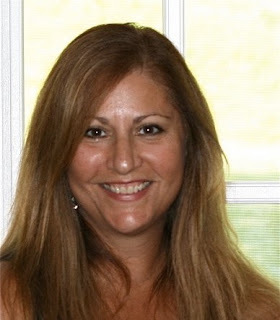 Lynne Constantine, Author
Lynne Constantine, AuthorTHE VERITAS DECEPTIONA reviewer of Lynne Constantine’s soon-to-be-released thriller, THE VERITAS DECEPTION, says it is "A delicious blend of desperation and intrigue." Constantine says it’s a thriller because it’s “high stakes” and “The pace is fast and the action never stops.”
Constantine likes writing thrillers, and plans for THE VERITAS DECEPTION to be the first of many with these protagonists. She and her sister are getting ready to publish a domestic thriller. She is a contributor to Suspense Magazine and a contributing editor to The Big Thrill magazine.
When she's not writing, she enjoys walking with her husband and golden retriever. Her two teenagers keep her up to date with the latest movies. She loves "hanging out" with her family.
Don’t miss the excerpt from THE VERITAS DECEPTION following her interview.
Q: What makes THE VERITAS DECEPTION a thriller?
Lynne Constantine: The high stakes. Jack and Taylor are running for their lives. They’re trying to find someone who’s responsible for the death of Taylor’s husband, a US senator, as well as for compromising another US senator. The pace is fast and the action never stops.
Q: Why will readers embrace your protagonists, Jack and Taylor? Do you consider them heroes or just everyday people we can all relate to?
Lynne Constantine: Jack and Taylor are ordinary people who find themselves thrust into extraordinary circumstances. They grew up next door to each other, were high school sweethearts and had everything in their lives all planned out. But things didn’t turn out like they planned. Events in both of their lives turned everything upside down and they ended up going down two completely different roads. When the book opens, they haven’t spoken to each other in over fifteen years and they find themselves on the run together—something they would have never imagined in a million years.
Q: How did your career in marketing and advertising help you write THE VERITAS DECEPTION?
Lynne Constantine: It was the realization of how susceptible we are to the images and messages inundating us everyday that became the seeds for THE VERITAS DECEPTION. As I sat in meetings with executives talking about ad campaigns and how to change the perception of the public toward our product, it made me start to wonder about other people in other meetings. From there it was easy to imagine a world where changes and trends in public opinion weren’t random, but a result of orchestrated efforts between advertising, media, and legislature.
Q: What makes your plot credible? How important is believability to tell your story?
Lynne Constantine: I did a lot of research into the historical components of the plot. The credibility of the conspiracy is helped by the fact that many of the plans of the antagonist have already come to fruition in reality. For example, when I started the book over twenty years ago and came up with ideas for outrageous television shows, one of them was about a charming serial killer. I also wrote about ads for condoms and other sexual aids. At the time, there was nothing like that on t.v. Before the book came out, Dexter had come and gone, and those types of ads were commonplace. The change has been so gradual that it’s easy to go unnoticed. It’s only if you take a snapshot of entertainment from twenty years ago and compare it to today that you see the extreme contrast.
Q: Does the concept of heroes and villains apply to THE VERITAS DECEPTION? If so, what are the characteristics of an effective and compelling villain?
Lynne Constantine: Yes. The book is all about good vs. evil and the traditional hero and villain. An effective and compelling villain is actually the hero of his or her own story. Aside from motivation for his or her actions, a complex back story makes a more interesting and believable villain.
Q: You’ve also written short stories and co-authored a novel. Do you prefer writing novels or short stories? What can you do better in a novel?
Lynne Constantine: I much prefer novels. I become very attached to my characters and I need the long form to allow them to develop and grow. A novel has the time to explore in greater depth the character journey and metamorphosis present in a good story.
Q: Without giving anything away—no spoilers please—what does the title, THE VERITAS DECEPTION, mean?
Lynne Constantine: Veritas is Latin for truth. So it literally means the truth deception.
Q: Did you write THE VERITAS DECEPTION strictly to entertain, or did you embed a few messages along the way?
Lynne Constantine: There are themes in the book of faith, redemption, forgiveness, and grace. I tried hard not to impose my own opinions but rather to let the characters and their experiences speak for themselves.
Q: What’s next? Will you write another novel? Will you continue to write thrillers?
Lynne Constantine: Yes and yes! I love writing thrillers. I’m hoping that this is the first in a series with Jack and Taylor. Also, my sister and I have a domestic thriller coming out with a traditional publisher that we’re very excited about. That deal will be announced in September, and she and I will continue to write together as well.
Q: Tell us about Lynne Constantine. What do you like to do when you’re not writing?
Lynne Constantine: I love to read, of course. And watch too much television. I adore the beach, and weather permitting, will start the day with a walk with my husband and our golden retriever. I have two teenagers who keep me up-to-date with the latest movies and trends and I love hanging out with them. Time with family and friends is the best way for me to unwind.
About Lynne ConstantineLynne Constantine is a coffee-drinking, Twitter-addicted fiction author always working on her next book. She likes to run her plots by Tucker, her golden retriever, who never criticizes them. Lynne is the co-author of CIRCLE DANCE, as well as several short stories. She is a monthly contributor to Suspense Magazine and a contributing editor to The Big Thrill magazine. Lynne has a master’s degree from Johns Hopkins University. Visit Lynne at www.lynneconstantine.com About THE VERITAS DECEPTION
There is a way that seems right to a man, but in the end it leads to death.Proverbs 14:21
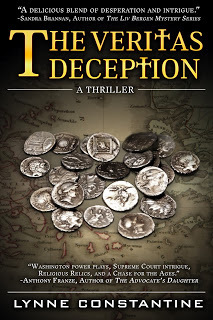 Days after US Senator Malcolm Phillips changes his vote on a bill he sponsored, he is murdered and his death disguised as an accident. He contacted one man before he died: investigative journalist, Jack Logan. He left Jack a single clue to help him uncover the truth and keep Phillips’s widow, Taylor, safe. But safe from whom?
Days after US Senator Malcolm Phillips changes his vote on a bill he sponsored, he is murdered and his death disguised as an accident. He contacted one man before he died: investigative journalist, Jack Logan. He left Jack a single clue to help him uncover the truth and keep Phillips’s widow, Taylor, safe. But safe from whom? Jack and Taylor’s desperate hunt leads them to a vast network of corrupt authority, controlling everything from social media and television programming to law enforcement and US legislation. The key to unraveling a complex web of lies is a set of ancient relics, dating back to the time of Christ. But what do these relics have to do with a senator’s death?
Allies turn to foes when Jack and Taylor discover that those closest to them are part of the conspiracy, and that they too have been manipulated. How long has a puppet master been pulling their strings—and will Jack and Taylor trust the right people long enough to win what becomes a colossal battle for souls?
Excerpt
Chapter One
Jack Logan had ditched his Catholic upbringing but kept the guilt. He hadn’t planned on blowing his entire afternoon listening to the woman he was interviewing talk about her dead daughter, but he didn’t have the heart to tell the grieving mother that he already had enough for the story. So instead, he bought her lunch anddinner, listening as she painted a picture of the girl she had loved and had failed to save. Now he was behind schedule and would have to work all night. Man, he hated the pieces involving kids. The parents got to him every time, and his attempts at comforting them were as effective as a Band-Aid on a gunshot wound. His phone was ringing as he approached the door to his apartment, and he jammed the key in the lock. Pushing the door open, he rushed over and snatched it, upsetting the bottle of Bass Ale and spilling the dregs on the table. “Great.” He clicked the green button. “Yes?” “Could you sound any more annoyed?” It was his editor. “Sorry, Max. What’s up?” He sunk into the worn leather sofa and ran a hand through his hair. “Tried your cell. Went right to voice mail.” “I was interviewing one of the mothers.” The sound of papers rustling came over the phone. “You already did your piece on the decision. What’s the angle on the follow-up?” “The fall out, the casualties left in the wake of the decision to let the show go on.” A sharp intake of breath. “You’re not saying they should have censored it?” “No, no. Of course not. But their voices deserve to be heard.” This had been a particularly difficult assignment for him. He wasn’t much of a television watcher, but when the class action suit involving the production company behind Teenage Wasted reached the Supreme Court, he’d tuned in. At first it looked just like another of the ubiquitous reality shows jamming the airwaves—an eclectic group of teenagers allowing the cameras behind the scenes into their world. Within the first five minutes of the show, Jack had sat open-mouthed while a young man retrieved paraphernalia from under his bed, pulled up a porn site on his computer, and began doing what your average adolescent boy did behind closed doors. Cheap shock value but not much in the way of entertainment. It wasn’t until he put the noose around his neck that Jack’s shock turned to horror. So that was what erotic asphyxiation looked like up close and personal.
LinksAmazon
Web page www.lynneconstantine.com@LynneConstantin
Published on August 08, 2016 18:34
July 27, 2016
WHAT THE EXPERTS SAY: Mark A. Flagel, Author
 Mark A. Flagel, Author
Mark A. Flagel, AuthorPRICE OF GOLDMark A. Flagel brings us a story he has wanted to write ever since hearing about the East German secret doping of its female athletes in the 1976 Olympics. His story is fiction, much of which occurs twenty years following the Olympic event, but based on historical facts, which one reviewer says is “a story that absolutely needed to be told.” Another reviewer says that PRICE OF GOLD: TWO WOMEN, TWO CHAMPIONS, TWO WORLDS is a “riveting novel that tells the story of two women swimmers, one American the other East German, who competed in the 1976 Montreal Olympics.”
Flagel is a retired lawyer who now gets to do what he’s always want to do: write novels. He is currently working on three other projects and hopes one of them will inspire him the way PRICE OF GOLD did. He likes to walk, think, and play poker, spend time with his grown children who are scattered throughout the U.S., and travel. He is particularly drawn to unusual acts of kindness.
Q: How did you become interested in Olympic swimmers, specifically the background for the women in PRICE OF GOLD: TWO WOMEN, TWO CHAMPIONS, TWO WORLDS? Are you a swimmer? What drove you to tell this story?
Mark A. Flagel: I first heard about the underlying historical facts, and in particular the secret East German doping of its own athletes and its impact on the 1976 Olympics, back in or about the year 2000. I thought it was a fascinating story, and was astonished that I’d not heard anything about it before. During the ensuing years I often told the story to friends, and each person I told invariably responded the way I first responded: What a fascinating story. Why haven’t I heard anything about this? When I was planning my March 2014 transition from lawyer to writer, it struck me that, since the actual underlying historical events hadn’t gained widespread attention, perhaps I could find a way through fiction to make the story resonate and get the attention I think it deserves.
Q: Did your career as a lawyer help you tell your story?
Mark A. Flagel: I think it helped, in at least two ways. First, the research skills I learned as a lawyer came in very handy, as I wanted to capture the essence of real, and quite chilling, saddening, and emotional, historical events. Second, my trial experience helped me dramatize the climactic courtroom scene involving the fictional cross examination of a former secret East German STASI agent, who had doubled as a trainer for the East German swimmers and had been an “enforcer” of the secret doping program. (To see what really made the cross-examination so dramatic, your readers are going to have to read the book!)
Q: What makes readers care about your characters, specifically the East German swimmer?
Mark A. Flagel: As Americans, we are naturally, and understandably, upset when cheating athletes essentially steal everything our honest athletes worked for their entire careers and lives. That’s what makes us care so much about Ivy, the American heroine of PRICE OF GOLD . The twist here is that the East German government set out to use its own young girls as guinea pigs, secretly giving them lethal steroids beginning at age eleven, hoping they would create super-athletes to help East Germany enhance its influence in the Soviet sphere, but knowing that, in the long term, they would create a generation of cripples who would also, in turn, likely give birth to handicapped children. Both things happened, and in a very real sense Hannah is as much a victim of this travesty as Ivy, and in some ways even more so, which is what makes us care so much about Hannah.
Q: How relevant is credibility/believability to telling your story? What kind of research did you conduct to assure accuracy for credibility? How accurate is the historical and political background?
Mark A. Flagel: Credibility is extremely important, and the historical foundation on which the book is built was crafted only after hundreds of hours of thorough and necessary research. Indeed, my research only deepened my resolve to create a historical fiction version of this story. There are at least three well-researched, non-fiction, academic books, along with an enlightening PBS special, that reveal the essence of the secret East German doping machine, its extent, its impact, and its fallout. Despite all these materials, relatively few people know about this important, and tragic, chapter in Olympic and doping history. I hope to change that, at least a little, and accuracy regarding the underlying historical and political background is and was an important part of that effort.
Q: Does the concept of heroes vs villains apply to your story? If so, what are the characteristics of an effective villain? Do you need a villain to have a hero?
Mark A. Flagel: This story raises a question that each reader will grapple with and resolve in her or his own way: who are the real heroes, and who are the real villains? Sometimes in this book, as in life, the answers are not that clear. That’s part of what I think has driven the so far very positive reviews of the book.
Q: Did you write PRICE OF GOLD only to entertain, or did you also embed some key messages? What did you want your readers to take away from your story?
Mark A. Flagel: Through PRICE OF GOLD , I wanted to bring attention to the heroic women who actually lived the tragic chapter of Olympic history created by the secret East German doping machine, honor the women cheated out of medals they had sacrificed everything for, yet recognize the very real and painful sacrifices made and suffering endured by the “other” victims of this politically inspired doping fiasco.
Q: How helpful was the setting of Montreal to adding suspense or drama to your story?
Mark A. Flagel: Montreal, of course, provides the flash-point for the East German, doping-driven gold medals that did and will forever fan the flame of this controversy. That said, the background of the story and the fallout from Montreal take place throughout the United States and Germany.
Q: Did you use humor to develop your characters or tell your story? How important is it?
Mark A. Flagel: Laughing is always comforting, it seems, and I think it was important for me, in PRICE OF GOLD , to use some humor to humanize the characters. But the strength of PRICE OF GOLD is its dramatic and emotional impact, not its humor.
Q: What’s next?
Mark A. Flagel: Good question! I’m not sure! I’m working on three different projects, and hoping that one of them will inspire me the way writing PRICE OF GOLD inspired me. If you look at my website, you’ll see a synopsis of one of my projects, called Peach Moments, which I use to refer to those moments of euphoria that all of us, regardless of who we are, where we come from, or how much money we have (or don’t have), are capable of achieving, in a variety of contexts. Stay tuned on that front.
Q: Tell us about Mark Flagel. What do you like to do when you’re not writing?
Mark A. Flagel: I like to walk and think. I like to play poker. I like to spend time with family which, in the case of my children, is not all that easy as my daughter lives in Pennsylvania, my oldest son is an Army Special Forces trainee currently stationed at Fort Bragg in North Carolina, and my youngest son is going to be a sophomore at USC. I like to hear about acts of kindness, above and beyond the ordinary. I get a lot of satisfaction from four non-profit organizations I’m involved in, the LA Regional Foodbank, College Track, College Match, and the Exceptional Children’s Foundation. And of course, I like to travel.
About Mark A. Flagel
Mark A. Flagel was born in Los Angeles, California in 1958. He graduated from Long Beach Wilson High School in 1976, UCLA in 1980, and UC Berkeley Law School in 1983. He practiced law for 31 years, then retired in 2014 to pursue his lifelong passion – writing. He hopes PRICE OF GOLD helps bring attention and, perhaps, even some form of relief and vindication to the heroic women who actually lived through the historical events that inspired the novel.
About PRICE OF GOLD
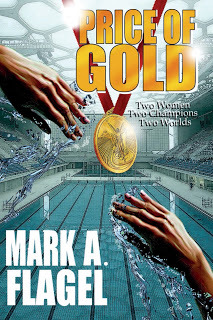 Ivy Johnson had never been more ready. The Montreal Summer Olympic Games. July, 1976. The United States just celebrated its 200th anniversary and Ivy, just shy of her 19th birthday, would deliver gold to her country and confirm her place among the greatest swimmers of all time. Hannah Eberhardt had different ideas. The 16-year-old East German, propelled by a secret guilt and a clandestine truth, crushed Ivy’s dreams and took gold back across the Atlantic, to the Fatherland. Ivy knew at the time, but couldn’t prove, she was cheated. Disturbing secrets emerging twenty years later, after the fall of East Germany, gave her another chance. Ivy headed to Germany to peel back the onion, confront her nemesis, and re-claim her glory, but as each layer came off, new, horrifying, and surprising truths emerged.
PRICE OF GOLD
is a work of fiction. But it is built on historical truth; painful historical truth; truth that illustrates the often gut wrenching price of gold, and the efforts of the heroic women involved in this tragic chapter of Olympic history.
Ivy Johnson had never been more ready. The Montreal Summer Olympic Games. July, 1976. The United States just celebrated its 200th anniversary and Ivy, just shy of her 19th birthday, would deliver gold to her country and confirm her place among the greatest swimmers of all time. Hannah Eberhardt had different ideas. The 16-year-old East German, propelled by a secret guilt and a clandestine truth, crushed Ivy’s dreams and took gold back across the Atlantic, to the Fatherland. Ivy knew at the time, but couldn’t prove, she was cheated. Disturbing secrets emerging twenty years later, after the fall of East Germany, gave her another chance. Ivy headed to Germany to peel back the onion, confront her nemesis, and re-claim her glory, but as each layer came off, new, horrifying, and surprising truths emerged.
PRICE OF GOLD
is a work of fiction. But it is built on historical truth; painful historical truth; truth that illustrates the often gut wrenching price of gold, and the efforts of the heroic women involved in this tragic chapter of Olympic history.LinksPurchase at Amazon Or Website
Author sitesFacebook
Published on July 27, 2016 21:30
July 20, 2016
WHAT THE EXPERTS SAY: Sheila Hageman, Author
 Sheila Hageman, Author
Sheila Hageman, AuthorBEAUTIFUL SOMETHING ELSE
STRIPPING DOWN: A MEMOIRSheila Hageman describes her newest novel BEAUTIFUL SOMETHING ELSE as a contemporary romance because it confronts issues today’s young women “go through when searching for love and self….like balancing love and career.” She cites interesting characters, humor, believability, and setting as important elements in a compelling romance—and, yes, maybe even some heroes and villains.
Hageman started out as a stripper and nude model and moved on to become college valedictorian and eventually earning an MFA in creative writing. Today she is a wife and the mother of three children, an author, a yoga instructor, writing teacher, and Body Image Expert. In addition to novels, she writes poetry and non-fiction. She is just finishing a draft of her next novel.
Q: You’ve described BEAUTIFUL SOMETHING ELSE as contemporary romance. What makes it “contemporary?”
Sheila Hageman: I think of BEAUTIFUL SOMETHING ELSE as contemporary because the story takes place very much in our present time and deals with issues I believe many young women go through when searching for love and self. This is a great novel for readers who like to really relate to the protagonist and understand the same types of modern-day issues like balancing love and career.
Q: What are the most important traits to readers of a compelling romance? How helpful is setting to developing a romance?
Sheila Hageman: I go off of what I’ve discovered I enjoy myself as a reader. A compelling romance for me needs to have interesting characters that are believable, but are at the same time experiencing something unique and story-worthy. I like to be able to relate to certain ideas or themes in a romance, but I also feel the desire to stretch my imagination in some areas. Setting plays such an important role in romance because lush, sensory descriptions can make or break a story. Since I like understanding my setting on a personal level, I think I may need to go on some exotic trips in my near future!
Q: Why will readers care about your protagonist, Lizbeth? Is she someone we can all relate to? What makes her unique? Or is she an “every-person” character?
Sheila Hageman: Lizbeth is your “every-woman” for many young women. She deals with issues that so many modern American women face—body image, self-esteem and desire for a loving partnership. A lot of us strive for so much and want to have it all, and Lizbeth experiences these drives along with confusion on how to achieve all she desires. Lizbeth faces these issues even as a thirty-year-old, which I think is an age many women are facing a reevaluation of their lives. She is unique in that she is divorced and still trying to chase a dream of stardom at an age after which many people have already settled into their “adult” lives.
Q: How helpful is the use of humor to tell your story? Do you believe humor is an important part of a romance?
Sheila Hageman: Humor is so important to me in life and love that it is no surprise to me that I wanted to incorporate it into my first romance novel. Life is funny and I most definitely wanted my heroine to be able to laugh at herself and the situations she finds herself in. I believe that’s even a part of her evolution in the book—Lizbeth becomes more able to laugh at herself and the world. Not all romances need humor, of course, but I find many contemporary romances incorporate some level of humor to reflect its importance in modern life.
Q: Are there heroes and villains in BEAUTIFUL SOMETHING ELSE? If so, what are the attributes of an effective villain?
Sheila Hageman: I believe the ultimate hero in BEAUTIFUL SOMETHING ELSE is Lizbeth herself because she goes through the most growth in so many dimensions of herself and her viewpoints on important issues. Her best friend Janet also goes through a series of realizations about self and life, which I believe paint her as a hero of her own life. Lizbeth’s love interest Chip definitely has some villain-ish tendencies, such as blaming others for his flaws, at the beginning of the story, but evolves into his own hero. The one true villain that Lizbeth has to grapple with is a manipulating film director who truly does not change or grow in the story, but rather remains treacherous and pompous.
Q: You have published poems along with non-fiction and your current novel BEAUTIFUL SOMETHING ELSE. When is poetry suitable to express your topic versus novel-writing? How is writing fiction different from writing non-fiction?
Sheila Hageman: Great question. I find that I go through phases when I need to express very strong emotions in a short amount of time and that is when I tend toward poetry. I like writing poems to capture a fleeting feeling or a moment in time that I know is so delicate if I don’t grab it in some way, I may never have another opportunity to. Writing novels seems like a good way to dive into a theme or an idea that I want to spend a significant time with.
Writing fiction and non-fiction feel so different to me. When I write memoir or personal essays, I tend to do a lot more mental brooding and less quick writing. At the beginning of an idea that feels like it needs to be explored through the personal, I will write quickly, but the connection-making and theme-building can come slowly.
Fiction has felt more free-flowing and less directed for me. I tend to be able to write quicker and with less stress when I have that space between my reality and my characters.
Q: Did you write BEAUTIFUL SOMETHING ELSE solely to entertain readers or did you embed a message or two as well?
Sheila Hageman: I definitely embedded my messages! The writing of a romance began as a writerly challenge between my writing friend and me. We wanted a break from the sometimes heaviness of memoir to write something lighter. As soon as I began, my main character quickly revealed to me that she was struggling with similar issues I have struggled with and have written about in memoir form. It seems like my deepest concerns for people and the world often emerge in my writing.
Q: How important is credibility or believability in telling your stories? How did you make your protagonist and her story credible?
Sheila Hageman: Believability is very important for me as a writer. I want to create characters and story that although they may be nothing close to a reader’s experience, they still ring true emotionally. I trusted my own experiences in life to create a believable heroine with real-life struggles and experiences. Although some of what Lizbeth goes through might seem exotic to someone who has never experienced city-life, I hope that readers will be able to envision themselves in similar situations.
Q: What’s next? Will you write another novel?
Sheila Hageman: I’m happy to say I am just finishing a rough draft of another novel, which would be best described as a crazy mix of humor, sci-fi, romance and erotica. I just went full-on write-what-makes-me-happy for this one.
I’m also working on a few potential next memoirs.
Q: Tell us about Sheila Hageman. What do you do when you’re not writing? What do you like to do to relax and have fun?
Sheila Hageman: I have three young children, a husband and a full-time job, so I am never not busy. It’s an exercise in madness that I can get any writing done at all. I love yoga; I’m actually also a certified yoga teacher. Right now, I work at Berkeley College in White Plains, NY, as an Academic Mentor, which means I get to spend a lot of time coaching and inspiring students. I also love teaching writing and work with clients one-on-one on their memoirs-in-progress.
About Sheila Hageman
Sheila is the ultimate survivor and risk taker—she’s a former stripper and nude model who became her college valedictorian, a yoga instructor, a writing teacher, an author, a mother and a Body Image Expert. She lives with her husband, three children and three cats in CT. She is an Academic Mentor for Berkeley College. She has taught writing at University of Bridgeport and Housatonic Community College.
She has a novel, BEAUTIFUL SOMETHING ELSE, out June 24, 2016, from 48Fourteen. Her memoir, STRIPPING DOWN, is a meditation on womanhood and body image. Her Decision-Making Guide and Self-Discovery Journal, The Pole Position: Is Stripping for You? (And How to Stay Healthy Doing It), Every Day Create, December 2011, helps women to further value their own identities through their quest to understand their motivations for stripping.
She received her MFA in Creative Writing from Hunter College, CUNY, where she also graduated as valedictorian with her BA in English. She blogs about her stripper past, motherhood, body image and other women’s issues at StrippingDown.com or you can visit her website SheilaHageman.com. Sheila has appeared on numerous TV shows including Today Show, ABC News, NBC News, and as an expert on Bill Cunningham and Anderson Cooper. She has been featured on Salon, Yahoo, Mamalode, Mom Babble, Say It With A Bang, She Knows, Role Reboot and The Huffington Post.
About BEAUTIFUL SOMETHING ELSE
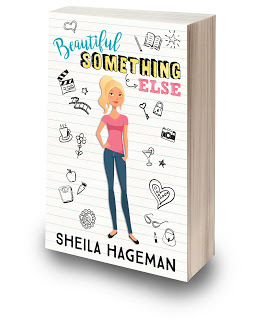 BEAUTIFUL SOMETHING ELSE is a contemporary romance with smarts and humor.
BEAUTIFUL SOMETHING ELSE is a contemporary romance with smarts and humor. Lizbeth, an outwardly-confident but overly self-conscious thirty-year-old, is spurred on by her New Age friend, Janet, to trust the Universe and ask for what she wants in life—to land a starring role, lose five pounds and find herself naked with a man. The stars seem to be aligning for her, but not exactly in the way she meant.
A chance encounter with a film director at Grand Central Station may be her lucky break, but the New York City actress is blindsided when she is fired from her bill-paying waitress job, and she must decide where her true values lie. Should she take a position as a “pretend secretary” for a handsome, but holier-than-thou chiropractor and healer with questionable morals to pay her rent?
While Chip Duncan woos a potential investor for his new healing center, he fights his romantic urges for Lizbeth. She finds herself falling in love with Chip’s caring, healing heart, but she’s equally frustrated by his greed and dishonesty.
Can Lizbeth resolve her body image issues and find a clear path to satisfaction in career and relationship? And will Chip realize in time that Lizbeth is the woman for him before he blows off her love?
Excerpt from BEAUTIFUL SOMETHING ELSE
“DO YOU HAVE A MISSION statement for your life?” Janet asked as she pushed a frazzled bunch of red curly hair from her face. “A what?” Lizbeth grimaced slightly before biting into her gooey tuna melt on wheat bread. “You know—a statement that sums up what you want from your life, or like, a guiding sentence to propel you forward.” Janet nibbled her egg white Western omelet and stabbed at her buttered wheat toast with a fork. “Hmm, I guess he forgot I wanted dry toast.” Lizbeth knew her friend was into new-age stuff, but she hated it when Janet assumed everyone was into it. “Um, why would I need a, a what? A life statement?” “Lizzie, I think creating a greater life purpose could move you out of this slump you seem to be in.” Ugh, here she goes, Lizbeth thought. Ever since her friend met a psychic healer, everything had to be about auras and chakras and now…life missions. “Excuse me? Excuse me?” Janet tried once again to get the waiter’s attention. Marnick’s was short-staffed—only two waiters for the entire restaurant on a Friday afternoon. “Oh! Did no one bring your toast yet? I’m so sorry; one of the waitresses had to put her dog down today, and well, you know how women are about their pets.” Lizbeth wasn’t sure if he was being snarky or sensitive or… “That’s all right. I’m fine. You know what? Don’t worry about it—a little butter is good for you.” Janet smiled in her sweet, all-knowing way. Lizbeth silently prayed that Janet wouldn’t mention her friend who claims to talk to dead animals. As the waiter retreated, Janet took a gerbil-sized munch of the lightly buttered toast. “Hmm, maybe I should call Bill, the pet psychic, to see if he can pick up any messages for the waitress.” “Janet, please, can we stick to our original subject? I can only take so much spacey stuff a day, you know? I imagine you already have one of those life mission thingies all typed-out and framed somewhere.” Lizbeth tossed a pickle chip into her mouth. She’d asked for extra, but only three came on her plate; she certainly wasn’t about to ask for more pickles now. “Well, yes, but not typed. I wrote it in calligraphy and hung it next to my bathroom mirror so I see it every morning. It helps me stay focused.” Lizbeth thought there might be some inherent good in being focused. In having personal goals. But she liked living by the seat of her pants, following her emotions and living in the moment. Lizbeth caught herself. Who’s the new-agey one now? “I don’t know what my life mission is. How does one figure something like that out anyway? Wait…what’s yours?” “I could tell you, but then I’d have to kill you,” Janet whispered and laughed, her eyes crinkling at the corners.
About Stripping Down: A Memoir
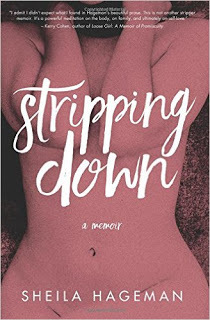 At twelve years old, everything changed for me with the discovery of my estranged father’s porn collection. Found locked away in a corner of the basement, the glossy images ignited in me an unrelenting desire for attention and adoration. I lost sight of my dream of being a writer and became obsessed with exercise, working out every day for hours and barely eating. I became that which I thought men adored—a stripper and a nude model.
At twelve years old, everything changed for me with the discovery of my estranged father’s porn collection. Found locked away in a corner of the basement, the glossy images ignited in me an unrelenting desire for attention and adoration. I lost sight of my dream of being a writer and became obsessed with exercise, working out every day for hours and barely eating. I became that which I thought men adored—a stripper and a nude model. Many years later when I discovered my mother had breast cancer, I was faced with who I had become and what I had used my body for. I quit stripping and returned to college to graduate as valedictorian; I also became a yoga teacher through which I learned how to take good care of my body and not be obsessive in my looks. I began writing again and then went to graduate school for my MFA in Creative Writing. At that time, reflections on my past as a stripper permeated my thoughts as I took on the new roles of mother, caregiver and wife. While helping my baby daughter take her first steps, I nursed my mother through the final stages of breast cancer and truly faced who I had become and who I had been.
Links
Amazon for BEAUTIFUL SOMETHING ELSE
Goodreads for BEAUTIFUL SOMETHING ELSE
Amazon for STRIPPING DOWN: A MEMOIR
Goodreads for STRIPPING DOWN: A MEMOIR
A few of Sheila Hageman TV Appearances:
NBC CT News, April 2012, Interview on Stripping Down
CT Style on ABC CT News, May 2012, Author Interview
Twitter: @SheilaMHageman
Published on July 20, 2016 19:14
July 10, 2016
WHAT THE EXPERTS SAY: Sylvia Stein, Author
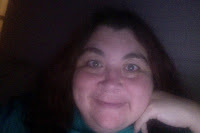 Sylvia Stein, Author
Sylvia Stein, AuthorA DIARY OF A BROKEN FATHER
CLOSUREComing soon! Sylvia Stein's A DIARY OF A BROKEN FATHER, a prequel to her first novella, CLOSURE. She wrote it in response to reader requests to understand the role of the abusive father in her original novella. She wanted to show how he became an alcoholic that caused him to abuse his daughter.
Stein is now working on her first thriller and, when she’s not writing, enjoys spending time with her husband and three children. She has also published a Young Adult novella, CHASING CLARITY.
Q: Why did you decide to write a prequel to CLOSURE? What inspired you to write A DIARY OF A BROKEN FATHER?
Sylvia Stein: I decided to write a prequel to CLOSURE because when I wrote it I had many readers ask me about Garrison and how they wanted to learn more about his alcoholic journey and try to understand him more. I thought about it and came up with his story and the inspiration was to try to show his journey and perhaps bring him into another light with readers.
Q: Garrison James, the “broken father,” does not seem to be a likable person. How do you engage readers to care what happens to him?
Sylvia Stein: I wanted to show what led him to become the awful and abuse father in CLOSURE and by sharing his AA journey I wanted the readers to decide for themselves by hearing Garrison share his journey.
Q: Alcoholism and abuse are complex subjects to understand and present to readers. How did you create credible issues and characters? Did you have to do extensive research?
Sylvia Stein: I wanted to show the stages of AA through Garrison’s struggle. I did research this and I wanted to make the character of Garrison believable so yes I researched AA and I also reflected upon people I know who dealt with this issue.
Q: Do you consider your protagonist, Garrison James, a hero or a villain?
Sylvia Stein: I consider Garrison both a hero and a villain as he goes through this pain he admits to himself the wrong he is doing and decides to try and emerge from it so I would say a blend of both but in the end he is just human and he makes mistakes.
Q: How helpful is humor to develop your characters or tell your story?
Sylvia Stein:Humor is important. However, I mostly brought this story from a dark place. I got really into the life an alcoholic and humor was not a big part of Garrison’s story.
Q: Did you write A DIARY OF A BROKEN FATHER primarily to entertain readers, or did you embed some messages in the story?
Sylvia Stein: I wanted to show a message in this story. I hope the reader will see it that way.
Q: What is the significance of the title A DIARY OF A BROKEN FATHER? Does Garrison keep a diary? NOTE: Do not explain if it’s a spoiler!
Sylvia Stein: I can’t give it away without spoiling it but I do cover it so the reader will see it. The title idea came from a good friend and writer Christopher Bartlett he helped with it when I went over it with him.
Q: How relevant or supportive to telling your story was the setting? Could A DIARY OF A BROKEN FATHER have occurred anywhere at any time?
Sylvia Stein:Since this was taken from Garrison’s perspective I felt the setting was a part of it but more importantly for this was Garrison’s account and the dates in the book. I think it could have taken place anywhere but for this story I made it appoint to keep date to keep it consistent with Closure which was the first novella.
Q: What’s next?
Sylvia Stein:Currently, I am an editing intern for Stitched Smile Publications where I am also a marketing intern, I am also a guest contributor for the Huffington post Blog focusing on Writing Tips, promos, Book reviews and my own books, and also I have a podcast on Podbean, “In the Artists Realm with Sylvia Stein”, and working on my first thriller for next year.
Q: Tell us about Sylvia Stein. What do you like to do when you’re not writing?
Sylvia Stein: I actually love spending time with my amazing husband Jeremy and three adorable children Paul, Michael and Connie. We love taking them to the movies, going out to eat and vacationing.
About Sylvia Stein
Sylvia Stein is a published author with several anthologies with her Writer's group 750 on Linked In. Stein obtained a Master's Degree in Creative Writing and English from Southern New Hampshire University in July 2015. She is a mother of three children and resides in the city of Fuquay Varina with her husband.
Stein has also published two solo books; one was her first novella CLOSURE which she worked on while attending SNHU and published in July of 2014. The other her first YA CHASING CLARITY published this past October 2015 and was created during National Novel Month (Nano) in 2013. When she is not writing she enjoys time with her children and husband.
About DIARY OF A BROKEN FATHER
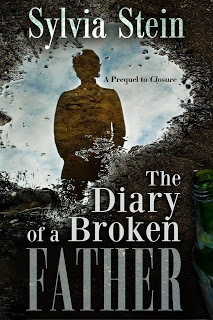 Garrison James could still hear the screams of his little girl, Sara, like it was yesterday, “Daddy, daddy, please forgive me!” He messed up his life and hers as well. How can he make it up to her? As he struggles with his alcohol addiction, Sara leaves him with her aunt and later goes to college to pursue her own dreams, leaving him behind.
Garrison James could still hear the screams of his little girl, Sara, like it was yesterday, “Daddy, daddy, please forgive me!” He messed up his life and hers as well. How can he make it up to her? As he struggles with his alcohol addiction, Sara leaves him with her aunt and later goes to college to pursue her own dreams, leaving him behind.In this gripping tale and prequel to CLOSURE, Garrison tells his life story and the struggles that he faced during his alcoholism and the acceptance of Sara’s need to find her own path in life. Can he ever make it up to Sara? Can his daughter ever forgive him? More importantly can he forgive himself?
Follow his journey in this heartbreaking but uplifting story.
About CLOSURE
Garrison James had it all. A terrific home life and a loving family. Together, he and his wife built a successful ranch and
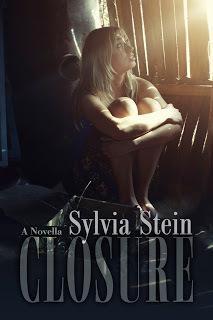 construction company. His world changed the day he lost his wife to cancer. He turned to the bottle and became a monster. Sara, his daughter, tried everything to please him.
construction company. His world changed the day he lost his wife to cancer. He turned to the bottle and became a monster. Sara, his daughter, tried everything to please him.
After years of abuse, Sara’s aunt visits. She recognizes the abuse and removes Sara. The frail girl begins the delicate journey of find herself, while struggling to leave her father and the monster behind.
Despite the emotional and mental scars she carried, Sara manages to start a new life. She is finally happy.
A phone call changes everything.
Will Sara continue her new life? Can she face the monster, or will she find closure?
Links
Web pageFacebook Twitter @sylvia_stein07 Amazon author page Goodreads
Podcasts:
http://sylauthor07.podbean.com
https://www.facebook.com/SylviaSteinPowerHour07/In the artists realm
http://www.huffingtonpost.com/entry/closure-novella-by-indie-author-sylvia-stein_us_576acb75e4b0869377fb7301
Links for ClosureAmazon
Published on July 10, 2016 19:57
July 6, 2016
WHAT THE EXPERTS SAY: Joel T. McGrath, Author
 Joel T. McGrath, Author
Joel T. McGrath, AuthorSOMETHING ETERNAL
Kindle Scout EntryJoel T. McGrath brings us SOMETHING ETERNAL, a story he has entered into Kindle Scout to win a five-year publishing contract. Currently he is focused on “building a fun, insightful audience” and hopes to attract readers to nominate SOMETHING ETERNAL on Kindle Scout. McGrath describes SOMETHING ETERNAL as only he can (see his response to the first question), but he says it's a "fun read" that "almost anyone should enjoy." He provides an excerpt following the interview.
A member of the New Hampshire Writers’ Project, McGrath is a four-time top 20% choice for the Amazon Breakthrough Novel Award with four different manuscripts. He is currently working with a Disney illustrator on a graphic novel.
Don't miss the giveaway opportunity available following the interview.
Q: How would you characterize SOMETHING ETERNAL? In what genre[s] would you place it? Is it paranormal? Romance?
Joel T. McGrath: A non-gender skewed, non-genre skewed, YA, magical-realism, modern-day setting that’s fun, action packed, full of great characters, crisp dialogue, steady pacing, and yes, the three aspects of love: lust, romance, and hate, all have a distinctly blurred residence in SOMETHING ETERNAL. (*Out of breath*)
Q: Who are the most likely readers of SOMETHING ETERNAL? Is it for young adults or all ages?
Joel T. McGrath: You know, I didn’t box it into a corner. I hate saying it’s for this age group or genre. It’s a fast, fun read packed with cool, fresh stuff almost anyone should enjoy.
Q: What makes SOMETHING ETERNAL unique?
Joel T. McGrath: Probably my upbringing, I was raised to believe I would never die. Since becoming a nurse years ago, I have, firsthand, watched death and suffering on a scale I wish I had not. It makes you think about life more often than I ever had before.
Q: How do you help readers engage with your characters? Why do we care what happens to them? Have you based them on real people?
Joel T. McGrath: Shocking things happen in life. Shocking things happen in SOMETHING ETERNAL. The characters are based off of things I have seen and heard throughout my life. Many are things I don’t necessarily agree with, but understand. Whether you love or hate my characters, you’ll find a piece of yourself in them, and that’s why you’ll care.
Q: Is there a “villain” in SOMETHING ETERNAL? Do you believe that you need to have conflict between a villain and a hero to have an entertaining story?
Joel T. McGrath: No. I have antagonists, there’s a difference. Conflict is a part of everyday life; it doesn’t need some great evil power or heroic figure, it just needs to be genuine. Villains and heroes are passé, but that doesn’t mean someone can’t act treacherously or bravely or even both at different times in their life.
Q: Do you write purely to entertain your readers or did you embed some messages in SOMETHING ETERNAL?
Joel T. McGrath: I’m not big on messages. I don’t think I’m smarter than other people, yet people are always trying to separate you from your own thoughts, mostly it’s people you trust. Your ability to think for yourself is the greatest gift you will ever have. That being said, yes, I want to open a world of possibilities you may have never considered when exploring SOMETHING ETERNAL.
Q: How helpful is humor to create characters and/or develop the plot?
Joel T. McGrath: It’s only helpful if it’s applicable. When in doubt, leave it out. If it’s the character’s defining quality, you had better be able to pull it off, because nothing will sink your plot or character faster than poorly timed humor. At the same time, I hate heavy-handed material, too. You’ll find dabs here and there in SOMETHING ETERNAL, kind of like salt at the dinner table. A little is good, but too much will kill you.
Q: How important is credibility in SOMETHING ETERNAL? What makes the story believable?
Joel T. McGrath: Let’s face it, fiction is only as good as its ability to convince the audience that unbelievable things are possible. I’ve carefully constructed rules in SOMETHING ETERNAL, rules which I will not break. Certain concrete rules help lend credibility to any work of fiction.
My characters and plot make SOMETHING ETERNAL “believable.” Despite the excerpt and glossary, my characters and plot have more to offer than books where the first and last page reveal everything that will ever happen. Some of my characters can be complicated and contradictory, yet it’s their interactions with each other that make SOMETHING ETERNAL “believable.”
Q: What’s next?
Joel T. McGrath: That is up to the readers. As you may know, SOMETHING ETERNAL is not for sale…yet. I’m hoping to win a five-year publishing contract. Those who read and nominate the excerpt from SOMETHING ETERNAL will get a FREE copy from Amazon should it win. I have other works planned, but I’m building a fun, insightful audience right now, and I’m completely focused on them.
Q: Tell us about Joel T. McGrath. What do you like to do when you’re not writing?
Joel T. McGrath: Sad but true, I think about writing when I’m not writing. No, but seriously, I love the theatre, music, animals, and meeting different types of people. I guess I just try to find balance with whatever I’m doing because life goes by quickly.
Thank you for sharing your time with me. I hope you will find me over on Kindle Scout starting 7/1/16, and I also hope you will nominate SOMETHING ETERNAL while you’re there. All books selected for publication will have free copies distributed to the readers who nominated them.
About Joel T. McGrath
Joel T. McGrath is a proud member of the New Hampshire Writers’ Project. He is a four-time top 20% choice for the Amazon Breakthrough Novel Award with four different manuscripts. He has sold foreign rights to his first novel through a literary agent in Turkey. Joel is currently working with a Disney illustrator on a graphic novel and hopes to release portions of the work in summer 2017.
About SOMETHING ETERNEAL
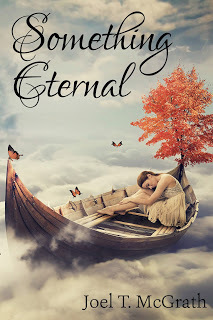 “Life without love is fire without flame.”
“Life without love is fire without flame.”In our time, wonder has disappeared. Most believe in what is seen, others in what is heard, yet a few know something eternal guides them.
When Vincent steals his older brother’s girl, Noemi, someone is going to die. Three lives, once ascending to greatness, are pitched into chaos. Jak, after months of searching, finds his younger brother, Vincent, while Noemi faces certain death. On one hand, Vincent can save her, yet others will die for their love.
Hearts prided on rational choices waver. Logic conflicts with reality, and emotion, not reason, decides the future.
Excerpt
Vincent eyed the six-foot, jumbled pile of wood nearby. Wiping his brow, he reached over, grabbing the unevenly weighted ax handle. He placed a block of wood on a large stump, and with two mighty hands, he raised the ax over top his head. His muscles expanded, heaving with lines of defined power. Vincent chopped down with a crack upon the block of wood, splitting it clear in half, and from the rubble, tossing the divided pieces airborne in opposed directions. At first, he had been too distracted by the loss of his vigor, his power, and source of his strength to notice Noemi’s sadness, but now he had restored a measure of balance within himself. Yet, he failed the first class of boyfriend 101, not listening, while trying to solve. Not hearing, thinking he understood, and dismissing any problem as tiny and illogical, yet with every rationale, Vincent missed the hidden, parched well of despair deep inside Noemi’s core. And though she smiled, it killed her a little more each time he ignored, whether on purpose or by accident, the deprived, soft coal of her slow burning, resentful heart toward him.Down in the swaying wheat fields, Noemi had plenty of time to think. Her face flushed, rosy red from the sun, she sauntered along, tending to the animals, while gathering a bouquet of aroma-filled flowers into her wicker basket. She plucked red clovers. An eruption of orange, black, and white spotted butterflies hovered circles around her. Their tiny, delicate wings fluttered up and down with gradual majesty. The butterflies slowly dispersed, their soft wings tickling her skin as they did. Yet one rested on Noemi’s index finger. She carefully brought her finger to eye level, smiling while examining its fragile wings. The butterfly soon flew off into the vast, blue sky along with the others. Her smile straightened. Her eyes dimmed. She looked at her surroundings and sighed.Noemi knew something was wrong, she just did not understand why Vincent refused to admit it. Not only was her heart exposed, it was breaking. She felt as if her soul were eroding, that a void widened an empty space in her chest, which filtered into regret. There were mitigating factors. She was still young, and Vincent was younger than she was by two years still. Noemi had been so many things in her young life already. She was a warrior, an immortal, a force for good, a tool for evil, but she was a woman, and most of all, a teen trying to play house. She had been engaged to Vincent’s older brother no less, but she tried to forget that tragic romance. Noemi felt treasured in Vincent’s arms, though her own desire turned hostile, with a lessening of passion in recent weeks. She missed her parents, she missed her life, and she missed the world. She was isolated from her friends. She felt drained by her relationship with Vincent, and she wondered if he knew that everything she had sacrificed was for him.
Author Links
FacebookWeb pageKindle Scout -- Includes instructions to readers
Twitter - @joeltmcgrath1
A Note from the Author:
To breathe life into this book, I am asking for your support. During the month of July, Something Eternal will be in the running for a Kindle Scout publication contract. My book needs your nomination. If Something Eternal wins, you’ll receive a free copy compliments of Amazon. Links for nominating Something Eternal will be made available in July during my month-long nomination period. Please check out the Kindle Scout program and discover how readers are making their voices heard.
ENTER THE GIVEAWAY!
5 $10 Gift Cards – Winner their pick of the 5 in the order they are drawn. $10 Bath & Body Works GC, 1 $10 Amazon GC, 1 $10 Target GC, 1 $10 Starbucks GC, $10 Barnes & Noble GC
a Rafflecopter giveaway
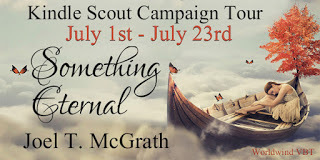
Published on July 06, 2016 18:36
July 4, 2016
WHAT THE EXPERTS SAY: Meghan McDonnell, Author
 Meghan McDonnell, Author
Meghan McDonnell, AuthorMINOR
NOVICE
LIMBO
ELSEWHEREMeghan McDonnell has chronicled her life in journals for more than 20 years beginning at age eight. She has published three of her journals: MINOR, NOVICE, LIMBO, and most recently ELSEWHERE where she reveals her “inner being” in a candid approach, but also recognizes that humor is “essential.”She is currently working on volumes 5 through 28. When she’s not writing, she loves to read and work crossword puzzles. She plans to get married in September.
Q: What drove you to write and publish your memoirs? Why did you choose to use the format of a journal?
Meghan McDonnell: I have been inconsistent in many areas of my life. The one constant has been writing. I have written with dedication and passion for most of my life, since I was eight years old. As for the format, it chose me. I decided to publish the journals because it was starting to feel like torture to have all of this material that I kept stacked on shelves in our second bedroom. I realized that if I was compelled to write so much, there could be people out there who want to read it. The contents of the journals are very much like life itself: unexpected, comprehensive, beautiful, poignant, funny, and startling.
Q: Who do you believe will be most interested in reading your memoirs?
Meghan McDonnell: Gauging from reader response so far, mostly young women. I believe anyone who likes memoirs, narratives, and creative nonfiction will enjoy them. Readers of Cheryl Strayed, Karl Ove Knausgaard, Abigail Thomas, and Joan Didion. Didion said, “Keepers of private notebooks are a different breed altogether, lonely and resistant rearrangers of things, anxious malcontents, children afflicted apparently at birth with some presentiment of loss.” I agree with her. I think I have a fixation with loss but I also think I have a sensitivity to what is thrilling and fascinating about life and people; what we don’t want to lose because it’s so glorious and gives our lives meaning.
Q: Why will readers be interested in reading your memoirs?
Meghan McDonnell: The journals are bare, candid, and authentic. I reveal my inner being through them. They’re an opportunity to relate and identify. A few reviewers have written that they felt a distinct sense of time and place in MINOR (the first volume). As I got older, I wrote about more universal themes (love, family, friendship, loss, travel, school, the real world, etc.) that transcend setting regardless of the cultural references that date or place the work. I write about how I feel but I include countless relevant topics (politics, socioeconomic statuses, books, music, film, culture, etc.) and stories I’ve collected from loved ones and strangers.
Q: What do you hope readers will take away from your books? Did you write them to entertain or to encourage readers to think or for any other reason?
Meghan McDonnell: I hope readers come away with a sense of relief and that they will feel less alone in their internal selves. I hope they feel refreshed. The journals are an invitation for readers to reflect and go within but there’s also humor and entertainment value. They’re a mirror and a window. I go all over the map in them and I think anyone who can step into the rhythm of the way I write will get into it. It’s simply another world. The best books transport us temporarily and stay with us.
Q: Your books cover your experiences and thoughts over a period of years. Do you find that there’s a difference in your insights and/or writing in current years from in the past? Are you able to offer any lessons learned?
Meghan McDonnell: I didn’t identify as strongly with what I wrote between the ages of 8 and 19. But I just finished transcribing volume four and I was surprised to find so many themes and ways of using words that are strikingly similar to what I still grapple with and the ways in which I continue to express myself in my journal today. My writing has become more sophisticated and higher quality several years in because I kept at it. I write to understand things, other people, and myself. As much as I can look back and laugh at my naiveté and innocence, I’m also sometimes moved by the depth and insight I had when I was younger.
Lessons I’ve learned (but don’t always put into practice): we are creatures of habit and patterns; just as nature has its cycles, as humans, we each have our own unique emotional, physical, spiritual, and psychological cycles; we change and evolve but who we are at our core remains constant; unless we elect to alter our beliefs, decades-old ideas can run roughshod through our lives and cause all manner of trouble (in practical and emotional ways); keeping a written record of your life can be as painful and cringe-worthy as it is helpful and illuminating. Passion and curiosity take us to beautiful places but can also make us angry and emotional. I don’t shy from that.
Q: How important is humor in your work?
Meghan McDonnell: It’s essential. We have to laugh in this life. We have to laugh at ourselves. I need levity to lift me out of the heavy landscapes I wander into when I write. Keeping a consistent journal can be like calling your mother or your best friend. You don’t often discuss everything that is going right or well in your life. You exchange woes, irritations, worries, thwarted dreams, and what isn’t working. Then you laugh and try to comfort each other. As much as I try to chip away at the meaning of life and the human experience, I need humor to bring me back from the brink and to move me out of all the investigation.
Q: A reviewer said that your work is “Sincere, honest, and real.” Would you agree? How difficult was it to write so honestly?
Meghan McDonnell: I’d like to agree with this reviewer. However, it’s nearly impossible to judge my own work. I have moments of feeling like it’s not bad. I have moments when I think it’s slop. But it’s like wallpaper to me. While writing, I’m consumed. I’m transported to another place. By the time I revisit what I’ve written, whether it is days or years later, I have a sense of remove or neutrality. What is singular about these books is that they were written in the moment with no consideration that anyone would read them. I’m not recalling or remembering. It was present-time and I couldn’t have made it up if I had tried in hindsight. I was concerned that when I decided to publish, that it would affect my writing going forward, knowing it will one day be read. But it hasn’t. Over the last 28 years, I’ve formed a habit and mode of being when I’m writing. This habit allows me freedom and release from self-consciousness when I come to the blank page. It wasn’t difficult to be honest. It was never a conscious consideration because I had learned from a young age that with writing, unlike anything else, I could let myself go without any filters.
Q: Can you explain the significance of your titles for the first three volumes: MINOR, NOVICE, and LIMBO?
Meghan McDonnell: MINOR comes from being underage, a reference to minor chords in music, and meaning lesser in importance. Not to disrespect my younger self, but these were the fledgling years when I was unwittingly developing my voice as a writer and therefore this is the roughest of the volumes.
NOVICE because it means being new or inexperienced in a field and that describes me aptly in volume two, when I left home to go to college and I fell in love for the first time. I had no clue what I was doing, academically or romantically.
As for LIMBO, volume three covers a challenging, in-between time in my life. I had taken time off school to travel and I was nursing a broken heart. I was stuck. Though I was only 20, I didn’t like not knowing what to do with my life.
Q: What’s next? Do you plan to do any writing other than your memoirs? Have you thought about writing fiction?
Meghan McDonnell: I continue to keep a journal. I’m focusing on volumes 5 through 28 - typing, editing, and publishing them. I’m writing articles for my blog and other online platforms. I’m at work on a Kindle Single about my stint as a mail carrier for the USPS. As for writing fiction, I don’t want to say never but it doesn’t come naturally to me. My fiancé and my sister wish I wrote fiction. Maybe one day I’ll surprise them and go for it.
Q: Tell us about Meghan McDonnell. What do you like to do when you’re not writing?
Meghan McDonnell: When I’m not writing, I read. I work part-time in administrative work. I love to camp and hike. My fiancé and I are buying a house and we enjoy home projects and gardening. We’re planning for our wedding in September. I have fireside talks with him in our backyard. He’s an artist and we spend hours exchanging ideas, encouraging each other, and reading ghost stories and folklore. I look forward to Sundays with a fervor because I can’t get enough of the New York Times crossword puzzle, the word jumble, horoscopes, and the advice column. I dream of a day when my oldest friends aren’t so busy with children and careers that they will be able to talk and hang out again. A dormant feminist has recently awoken in me and I feel compelled to explore femaleness in America in new ways. We have a long way to go in our culture to nullify hatred, violence, and “other”-ism. As I continue writing, I look forward to getting married, starting a family, and buying a cabin to write in. I exult, knowing I have so much more work to do and many more stories to tell.
About Meghan McDonnellMeghan McDonnell lives in Walla Walla with the man she loves. When she’s not writing or reading, she spends time outdoors, solves crossword puzzles, and pretends to garden.
About MINOR: Volume One
 MINOR
is the first installment of the personal journals in which, for over 20 years, writer Meghan McDonnell has chronicled her life beginning at age eight through present day. With searing candor and tenderness, her musings on daily life and observations of family, social and romantic relationships coalesce in a commentary on growing up, facing down passion and fear, and American life in the 21st century. Wide in scope and vivid in detail, her journals are her confessional love letter to the world. Join her on a fearless, vulnerable, sometimes painful and quixotic, but always honest journey, also known as the human experience. Readers who love Cheryl Strayed or Karl Ove Knausgaard will enjoy this author.
MINOR
is the first installment of the personal journals in which, for over 20 years, writer Meghan McDonnell has chronicled her life beginning at age eight through present day. With searing candor and tenderness, her musings on daily life and observations of family, social and romantic relationships coalesce in a commentary on growing up, facing down passion and fear, and American life in the 21st century. Wide in scope and vivid in detail, her journals are her confessional love letter to the world. Join her on a fearless, vulnerable, sometimes painful and quixotic, but always honest journey, also known as the human experience. Readers who love Cheryl Strayed or Karl Ove Knausgaard will enjoy this author.Volume one spans her eighth year through age 17; reflections on family, friendship, education, a stint at survival camp and coming of age. About NOVICE: Volume Two
NOVICE is the second installment of the personal journals in which, for over 20 years, writer Meghan McDonnell has
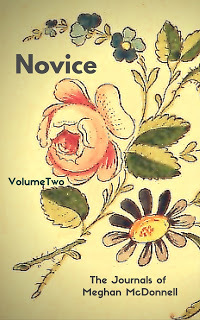 chronicled her life beginning at age eight through present day. With searing candor and tenderness, her musings on daily life and observations of family, social and romantic relationships coalesce in a commentary on challenges, facing down passion and fear, and American life in the 21st century. Wide in scope and vivid in detail, her journals are her confessional love letter to the world. Join her on a fearless, vulnerable, sometimes painful and quixotic, but always honest journey, also known as the human experience. Readers who love Cheryl Strayed or Karl Ove Knausgaard will enjoy this author.
chronicled her life beginning at age eight through present day. With searing candor and tenderness, her musings on daily life and observations of family, social and romantic relationships coalesce in a commentary on challenges, facing down passion and fear, and American life in the 21st century. Wide in scope and vivid in detail, her journals are her confessional love letter to the world. Join her on a fearless, vulnerable, sometimes painful and quixotic, but always honest journey, also known as the human experience. Readers who love Cheryl Strayed or Karl Ove Knausgaard will enjoy this author. Volume two of this addictive and vicarious series spans her freshman year of college, first love, a trip to Australia, and navigating young adulthood, living on her own among peers. About LIMBO: Volume Three
LIMBO is the third installment of the personal journals in which, for over 20 years, writer Meghan McDonnell has chronicled her life beginning at age eight through present day. With searing
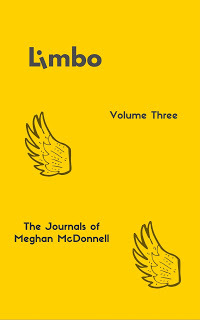 candor and tenderness, her musings on daily life and observations of family, social and romantic relationships coalesce in a commentary on challenges, facing down passion and fear, and American life in the 21st century. Wide in scope and vivid in detail, her journals are her confessional love letter to the world. Join her on a fearless, vulnerable, sometimes painful and quixotic, but always honest journey, also known as the human experience. Readers who love Cheryl Strayed or Karl Ove Knausgaard will enjoy this author.
candor and tenderness, her musings on daily life and observations of family, social and romantic relationships coalesce in a commentary on challenges, facing down passion and fear, and American life in the 21st century. Wide in scope and vivid in detail, her journals are her confessional love letter to the world. Join her on a fearless, vulnerable, sometimes painful and quixotic, but always honest journey, also known as the human experience. Readers who love Cheryl Strayed or Karl Ove Knausgaard will enjoy this author.Volume three of this addictive and vicarious series spans her search for identity, grappling with life choices and heart ache, and plans for travel to Europe.
LinksMINOR - AmazonNOVICE - AmazonLIMBO - Amazon
ELSEWHERE - AmazonBlog
Twitter @MegMcDonnell
Published on July 04, 2016 18:39
June 19, 2016
WHAT THE EXPERTS SAY: Christine Simolke, Author
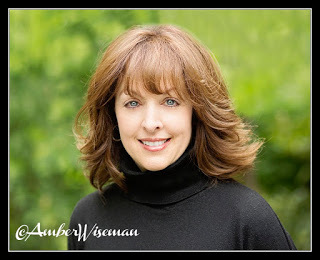 Christine Simolke, Author
Christine Simolke, AuthorCHILDREN OF ITALYChristine Simolke, the granddaughter of Italian immigrants, brings us CHILDREN OF ITALY, a story about the immigrant experience of a family in America. Simolke grew up hearing stories from her grandmother about leaving the country where she was born and moving to a new world. Her grandmother inspired her to write a book when she interviewed her for a research paper in graduate school.
Simolke is a former middle school language arts teacher. She lives with her husband in North Carolina, and enjoys spending time with husband, family and friends; reading; cooking, and working out. She also does volunteer work. She is working on a continuation of the immigrant Italian family from her book and has also written an historical middle grade novel.
Q: Why did you choose to set your story in 1924? What appeals to you about setting your story in the past?
Christine Simolke: The novel was inspired by my Italian grandmother’s immigrant story. I choose 1924 as it was the last year that Ellis Island was used as the primary entry to the United States for European immigrants.
Q: How do you make events occurring in 1924 relevant to contemporary readers?
Christine Simolke: Many of the events in the story are timeless as the characters deal with problems we all face including betrayal, longing, adjusting to new situations, struggling to figure out who we are and our place in the world, discrimination, and the importance love and family.
Q: Would you categorize CHILDREN OF ITALY as primarily a romance? Or…?
Christine Simolke: It’s an historical novel that would fall into the category of family saga as it tells the story of the immigrant experience with a focus on one family as they assimilate into a new country while dealing with the issues of infidelity, a marriage marred by years of separation, young love and various forms of discrimination. It does have romance, but it’s not primarily a romance novel.
Q: Why do readers care about your characters? Do you have to be an Italian immigrant to relate to them?
Christine Simolke: You don’t have to be an Italian immigrant to relate to the characters because their problems/triumphs are universal. Readers will relate to their experiences of love, heartache, disappointment, transgression, and happiness. The characters are well-intentioned, but flawed, especially Luigi, the father. He’s made many sacrifices to bring his family to America, but his infidelity has a profound effect on his family. His wife and daughters, especially Giovanna, experience new & renewed feelings of love and I think readers will root for them to find happiness.
Q: What kind of research did you do to assure historical accuracy?
Christine Simolke: I read extensively on the Italian-American immigrant experience and the time period, including the history of Italy and America in the late 19th and early 20th century. I also relied on the stories told to my by my Italian-American grandmother, and her sisters, which I documented over several decades.
Q: Did you write CHILDREN OF ITALY to entertain readers and/or did you embed a few key messages? What do you want readers to take away from your book?
Christine Simolke: I hope CHILDREN OF ITALY will entertain readers as the story takes many turns, but I’ve also touched on the issue of discrimination in several forms, the price of infidelity on a marriage and a family, and the adventure of beginning a new life and falling in love. I hope readers will understand a little better the immigrant experience and the sacrifices made by those brave souls who left everything behind to form our wonderful country.
Q: Does the concept of heroes vs. villains apply to CHILDREN OF ITALY? If so, what are the traits of an effective hero? A villain? Are heroes and villains relatable to readers?
Christine Simolke: There are definitely heroes and villains in CHILDREN OF ITALY, but they are more of the multilayered variety than your straight-forward comic book variety.
I think the traits of an effective hero/villain are that they aren’t all good or all bad. The notion that a hero has flaws and a villain has at least one attribute that allows the reader to sympathize with him/her is what makes them relatable, as we’re all a mixture of positive and negative qualities.
Q: How helpful is humor to develop your characters or to tell your story?
Christine Simolke: The characters use humor to cheer one another in dire circumstances and as a way to enjoy/entertain each other.
Q: What’s next? Will you write another historical novel?
Christine Simolke: I’m working on a continuation of the Falconi family’s story and I’ve written an historical middle grade novel.
Q: Tell us about Christine Simolke. What do you like to do for fun when you’re not writing?
Christine Simolke: I’m a former middle school language arts teacher. I love to spend time with my husband, family & friends; read, cook, and work-out to counter act all the Italian & Mexican food I love to eat! I’m also involved in volunteer work in my community.
Thank you for the opportunity to be featured on your blog!
About Christine Simolke
Christine Simolke is the granddaughter of Italian immigrants. She was inspired by her grandmother’s life story to write a novel of the immigrant experience. She has traveled to countries all over the world and is thankful that her ancestors chose to settle in the United States. She is a former language arts teacher and currently resides in North Carolina with her husband. They are the parents of two wonderful young men. When she is not writing, she's active in non-profit work.
The idea for her book, CHILDREN OF ITALY was formed many years ago when she wrote a research paper in graduate school based on an interview with her grandmother, Giovanna and stories her great aunt, Evelina told her. Her grandmother and her family immigrated from Italy to America in the 1920's, and Christine and her family were always fascinated by the stories of their voyage to America and their early life in the United States. Their tale of hope, struggle, perseverance and love of family has been an inspiration to all of the generations after them.
About CHILDREN OF ITALY
 Against the backdrop of the early 20th century, as millions of immigrants pour through the doors of Ellis Island in search of the American Dream, Italian immigrant, Luigi Falconi, works as a coal miner to carve out what he hopes will be a better life for his family, who remain in Italy. Soon he will be with them again, but a dark cloud threatens to ruin all he has struggled to accomplish. After twelve years apart, his wife, and three daughters leave Italy to join him in America. Luigi looks forward to their arrival with anticipation, but first he must end his affair with the troubled Isolde, who cannot accept that he has never loved her. Luigi is all she has, and she plots to keep him.
Against the backdrop of the early 20th century, as millions of immigrants pour through the doors of Ellis Island in search of the American Dream, Italian immigrant, Luigi Falconi, works as a coal miner to carve out what he hopes will be a better life for his family, who remain in Italy. Soon he will be with them again, but a dark cloud threatens to ruin all he has struggled to accomplish. After twelve years apart, his wife, and three daughters leave Italy to join him in America. Luigi looks forward to their arrival with anticipation, but first he must end his affair with the troubled Isolde, who cannot accept that he has never loved her. Luigi is all she has, and she plots to keep him.While on board the SS Roma as it sails to Ellis Island, Luigi’s eldest daughter, Giovanna, begins a romance with Alessandro, a dashing member of the crew. When he immigrates to America a short time after their voyage, intent on reuniting with her, she and her family have vanished. As the Falconi family struggles to assimilate in America, Alessandro perseveres in his hunt for Giovanna. His search intersects with the bitter Isolde’s efforts to win Luigi back, with heartbreaking and surprising consequences for all of them.
CHILDREN OF ITALY Excerpt Chapter 1
March 1924
All men have regrets. Luigi Falconi had only one. The guilt from it had robbed him of many a good night’s sleep. His transgression couldn’t be undone, but he could sweep it under the rug. He would begin tonight with a clean slate, as the Americans liked to say. He wanted to be the husband his wife, Appollonia, deserved. The father his daughters needed. Their years of being apart were over. His family was leaving Italy to join him in America. The thought of their arrival in New York in nine days filled him with hope. His dream of a good life for his family in a new country was becoming a reality. He had worked for twelve arduous years to fulfill his promise to them, but one more thing had to be done before their arrival. In the room above the ristorante, Luigi laid next to Isolde. Her body radiated heat, like the embers glowing in the fireplace. He wiped his face with his calloused hands and sat up in the sleigh bed, tracing his finger over the intricate carving etched in the headboard as if it would give him the words he needed to say. Coal dust blackened his nails, though he had washed in the porcelain basin on her dresser. A trace of black powder always remained, no matter how hard he scrubbed. He closed his hand into a fist. “This is our last night together,” he said, his voice stern and commanding. The words hung in the air over her bed, where a shadow stretched from the candle’s flame on the nightstand. Isolde opened her eyes. They were dark and vacant like those of the black rat snake that Luigi had seen coiled in back of the woodpile. “I wish it could be different, but don’t worry. I won’t make any trouble for you.” When she sat up beside him, the light of the moon beamed through the window behind her. She wrapped the blanket they shared around her shoulders like an open cloak, and her dark, tousled hair framed her solemn face and cascaded across her breasts. She reached up to run her fingers through his hair. “I’m meeting my family next weekend in New York,” he said in Italian, as if to emphasize they were coming from the old country. “I know,” she answered, without taking her eyes from his. The blanket fell from her bare shoulders, and he looked away. She touched his face and turned it toward her. “Stay with me tonight,” He had never allowed himself the intimacy of sleeping all night with her or any other woman he had used as a substitute for his wife. She kissed his neck and then his shoulder. “Don’t go yet,” she whispered. Her beautiful body illuminated by the moonlight mesmerized him, and when she moved her lips from his neck to his chest, he lay back on the soft pillow and closed his eyes.
Links
Purchase Links amazon.com bn.comhawkinspublishinggroup.commalaprops.com (Asheville, NC bookstore)
Author sitesBook Trailer Goodreads Facebook Twitter address: twitter.com/csimolke1
Published on June 19, 2016 21:27



